

10 Better Ways To Write “In This Essay, I Will…”
“In this essay, I will” is a common way for people to talk about what they will write in their essays. However, it’s often overused, which is why it might be wise to look into a few available alternatives. This article will share the best ones with you.
What Can I Write Instead Of “In This Essay, I Will…”?
There are plenty of other ways to write this phrase. We’ll take you through the following to show you how they’re effective:
- You will learn about
- You will find out about
- I find… really interesting…
- This essay demonstrates
- This essay will discuss
- In this essay, you will learn
- I will show both sides of the argument
- This essay will analyze
- I strongly agree/disagree, and this essay will explore why
- This paper will explore
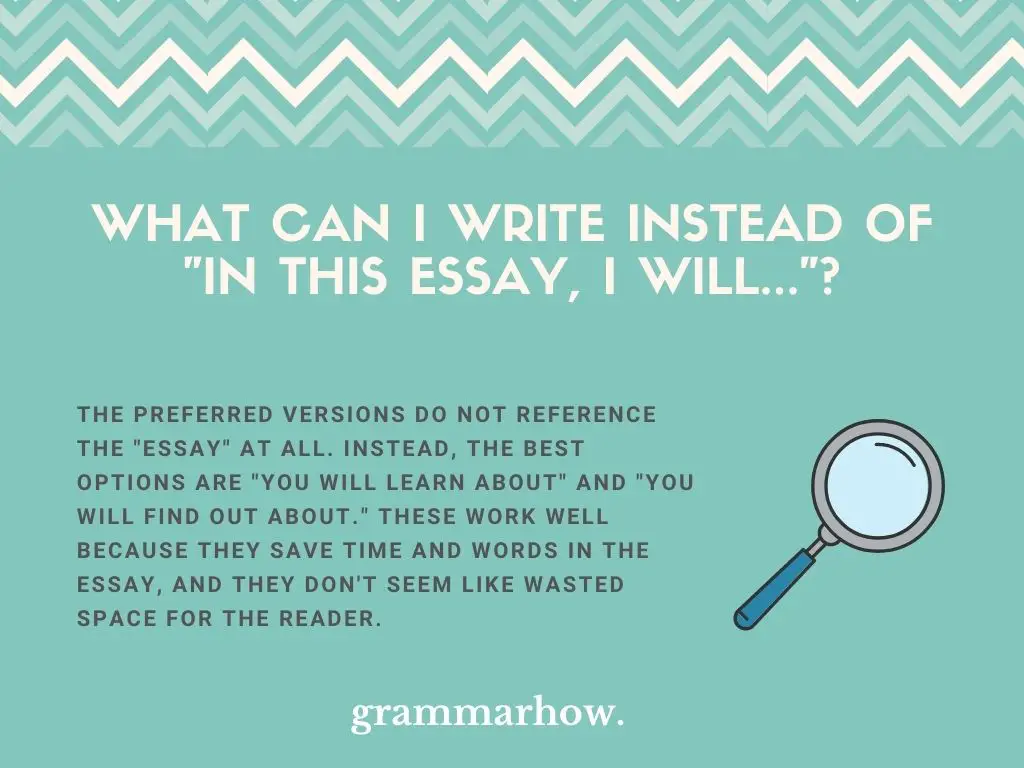
The preferred versions do not reference the “essay” at all. Instead, the best options are “you will learn about” and “you will find out about.” These work well because they save time and words in the essay, and they don’t seem like wasted space for the reader.
You Will Learn About
“You will learn about” works well because it shows the reader straight away what they will learn. We do not have to use the phrase “In this essay” or anything similar because they’re already aware that they are reading an essay.
The biggest problem with writing “in this essay” is that it’s a waste of time and words. Anyone reading your essay is typically evaluating it, so they do not need to be reminded what they are reading.
Instead, you should try to impress them with the contents of your essay and the points you want to highlight. The quicker you can explain the basic points you will touch on, the more engaged your examiner will be throughout the written piece.
Here are a few examples that will help you make the most of it:
- You will learn about my beliefs here, and I will make sure to elaborate on why I think it’s important to change the current rule system.
- You will learn about how it helps to practice these things before you undertake them.
- You will learn about what makes elephants such captivating creatures, and I’ll be sure to convince you by the end.
You Will Find Out About
“You will find out about” works in much the same way. We still do not mention the “essay.” It helps us show what we will be demonstrating. It only needs to be a sentence or two, but it’s a great way to explore our main idea without any other unnecessary bits.
Check out some of these examples to see how it works:
- You will find out about what makes them tick and how you can decide whether they’re right for you and your lifestyle.
- You will find out about many things from this piece, and I’ll make sure that your mind will be blown by the end of it.
- You will find out about the inhabitants of this fine city, as I will demonstrate going forward.
I Find… Really Interesting…
“I find… really interesting…” is a two-part phrase. We typically include the subject of the essay after “find” and then go on to explain why we find that subject “really interesting.” It’s a great way to avoid using “essay” in the introduction for no reason.
We can use this phrase with great success in many cases. It helps us to evaluate the overall tone and message behind our essay before we’ve even begun. Many readers and examiners look forward to reading essays set up in this way.
You can see how it works in the following examples:
- I find the people’s beliefs really interesting because they do not back down from them even when challenged.
- I find the current state of things really interesting because they’re nowhere near as glamorous as they would have been five decades ago.
- I find the things we talk about really interesting, and I will explain to you what it takes to become the best teacher you can be.
This Essay Demonstrates
“This essay demonstrates” is a good phrase to start an essay if you want to include the phrase. There is nothing fundamentally wrong with starting essays with a phrase like this; it mostly depends on personal choice and writing style.
Some examiners do not like reading things starting with “in this essay” or “this essay does this.” In those cases, you might be better suited to try to remove it. It’s also good practice to get you used to start your essays in more exciting ways.
However, if you like the style of including “this essay” and similar phrases, there are no reasons why you shouldn’t be able to do that!
- This essay demonstrates my vital opinion on the matter and what we can do about it.
- This essay demonstrates everything you need to know about how to fix the issue.
- This essay demonstrates why it is crucial that we start making strides to fix the current global situation.
This Essay Will Discuss
“This essay will discuss” is another way to share the overall point of your essay. The sooner we can convey the overall meaning, the more interested the reader will be. It helps them to know what they are reading about before they begin.
Here are a few examples to show you how it works:
- This essay will discuss all of the most important things you need to consider.
- This essay will discuss what it takes to make it in today’s climate.
- This essay will discuss the importance of making sure you care for your family no matter what.
In This Essay, You Will Learn
“In this essay, you will learn” helps to show a bit more confidence in your writing skills. If you say “you will learn,” it sounds like an order, which is a great way to show that you are confident enough to explain things correctly. It’s the mark of a strong and capable writer.
Check out some examples of how it might work:
- In this essay, you will learn a lot about what needs to be done to correct the path you’re going down.
- In this essay, you will learn all the psychological benefits of doing physical exercise daily.
- In this essay, you will learn how to manage your stress much better.
I Will Show Both Sides Of The Argument
“I will show both sides of the argument” helps you to evaluate the question of the essay. This works because it does not outright state you are writing an “essay” (saving time). It also shows that you want to cover both sides to remain unbiased as best you can.
Here are some examples of how it works:
- I will show both sides of the argument before the end of this paper.
- I will make sure to show both sides of the argument and try to convince you to agree with my view.
- I will show both sides of the argument and come to an ultimate decision by the end.
This Essay Will Analyze
“This essay will analyze” is another great way to start an essay with the words “essay” and “will.” It helps to sound confident when using phrases like this, and it goes over the things that the essay is likely to cover.
Some examples will help you to understand it better:
- This essay will analyze the effects on children of being surrounded by troublesome youths.
- This essay will analyze the findings from my previous experiment.
- This essay will analyze common social interactions and why they exist.
I Strongly Agree/Disagree, And This Essay Will Explore Why
This phrase works well to either agree or disagree with the question. Most essays ask a question that you are supposed to ponder. Starting an essay with your direct opinion is a good way to engage the reader early on.
The sooner you can keep the reader engaged, the better off you’ll be. It’ll make your writing sound much more professional and should score you higher marks in the long run.
Check out these examples for more help:
- I strongly agree with this question, and this essay will explore my reasons why.
- I strongly disagree with the quote above, and this essay will explore why.
- I strongly agree with this, and this essay will explore why I think that this is the best move for everyone.
This Paper Will Explore
“This paper will explore” is the last alternative we want to cover. It’s possible to replace “essay” in all cases with “paper,” and many readers prefer to see this because it does not sound as wasteful or as obvious.
The idea behind both “this essay” and “this paper” is the same. However, it’s up to you which one you think looks best on the page.
Here are some examples:
- This paper will explore the benefits of outreach for smaller companies.
- This paper will explore how to keep member retention much higher than in previous calendar years.
- This paper will explore the effects of mental illnesses.

Martin holds a Master’s degree in Finance and International Business. He has six years of experience in professional communication with clients, executives, and colleagues. Furthermore, he has teaching experience from Aarhus University. Martin has been featured as an expert in communication and teaching on Forbes and Shopify. Read more about Martin here .
- “Strongly Recommend” vs. “Highly Recommend” (Difference Explained)
- 10 Other Ways to Say “I Am” in an Essay
- 11 Other Idioms for “Two Sides of the Same Coin”
- 11 Other Ways To Say “I Think” And “I Believe” In An Essay

9 Synonyms for “In This Essay, I Will”
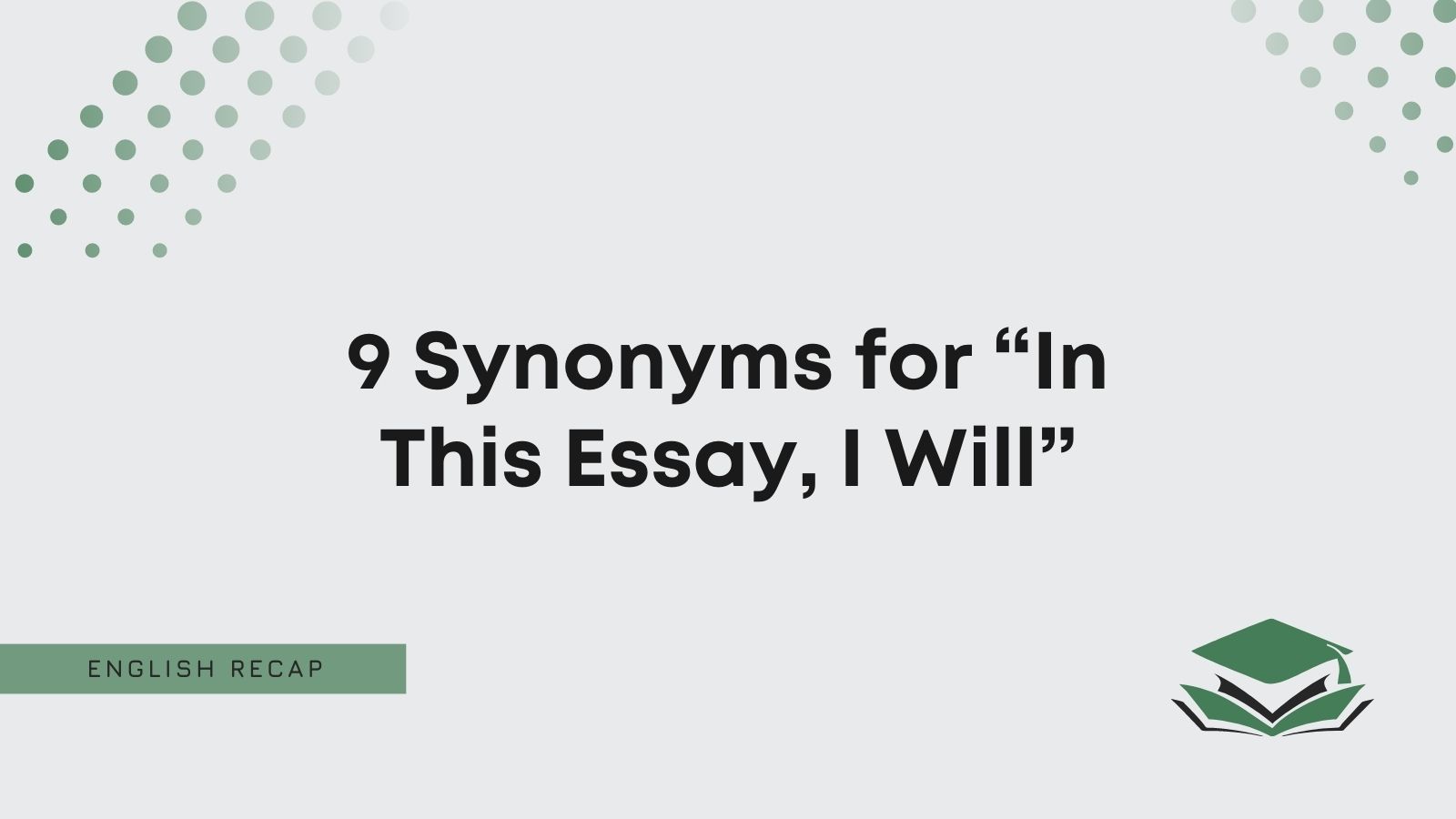
It’s all too easy to fall into a repetitive trap in essay writing. So, you need to actively avoid being too repetitive and boring.
This article will explore another way to say “in this essay, I will.” There are plenty of great alternatives available that will spice up your essays.
Is It Bad to Say “In This Essay, I Will”?
It is bad to say “in this essay, I will.” Generally, it’s a repetitive and bland phrase that adds nothing of value to your essay. The reader knows they’re reading your essay, so you shouldn’t be redundant and say “in this essay, I will.”
It is too personal of a phrase to include in most essays. Also, it’s informal , making it problematic when you’re writing in a more formal environment.
- It’s clear.
- It’s a basic phrase that might help you write your first essay.
- It’s redundant.
- It makes your essay sound boring and repetitive.
Clearly, “in this essay, I will” is not a good phrase to use. If you want to keep your essays readable and interesting, you should have a few synonyms ready to go.
Keep reading to learn alternatives to “in this essay, I will.” We’ve also provided essay example sentences for each.
What to Say Instead of “In This Essay, I Will”
- You will learn about
- I find… really interesting…
- This essay demonstrates
- We will discuss
- The key factors are
- Both sides of the argument will be explored
- I will analyze
- I will explore
- My personal reflections
1. You Will Learn About
One of the best alternatives to “in this essay, I will” is “you will learn about.” Using “you” instead of “I” makes it clear to the reader what to expect from your essay.
Generally, this phrase implies that you are writing your essay for the reader. It puts them in control and shows them that they should listen to what you have to say.
It’s also a very confident phrase. Saying “you will learn” is very confident and implies that you are certain you will teach the reader something new .
You may also benefit from the following examples:
You will learn about different systems in place to keep the workforce moving. Also, I will explore alternative options that might appear in the future.
You will learn about all of the relevant arguments. Hopefully, you can come to your own conclusion alongside mine.
2. I Find… Really Interesting…
Start an essay with “I find” to discuss the topic . It allows you to explain what you’re going to discuss later in the essay. From there, you can say how interesting you find it.
So, the full phrase might look like this:
- I find this topic really interesting .
It’s a simple sentence, but it’s a great way to set up an essay. It’ll entice the reader immediately. From there, you can start talking more about the topic and what makes it so interesting to you.
Here are a couple of examples to help you understand it:
I find these matters really interesting , so I would like to discuss them in more detail. It’s vital you understand more.
I find the experiment really interesting . Therefore, I will be exploring the different ways to go about completing it.
3. This Essay Demonstrates
Another great confident alternative to “in this essay, I will” is “this essay demonstrates.” Using “demonstrates” shows that you know your essay is good and will explain something important to the reader.
However, you should always be careful using a phrase like this too often. Any phrase that includes “this essay” in it might be a bit redundant and overused. It could bore the reader if you’re not careful. Use it once only. Any more than that might cause issues.
You can also refer to the following examples:
This essay demonstrates the difference between the two standpoints. After that, you can create a fair conclusion.
This essay demonstrates the different means behind both arguments. Therefore, you will learn which one you relate to more.
4. We Will Discuss
There’s no reason why you can’t use “we” to group yourself and the reader together . It shows that you value the reader’s insights just as much as your own while writing an essay. That’s why “we will discuss” works so well here.
It tells the reader what to expect . Also, it’s a great way to open a discussion quickly inside an essay. Then, the reader will be much clearer on where you’re going and whether they’re interested in your essay.
Here are some examples to help you understand more about it:
We will discuss the alternatives to see whether there are better options. The conclusion will determine which is the best.
We will discuss both theories in great detail. It’s the only way to settle the debate and decide which is better.
5. The Key Factors Are
It’s also worth including fancy words in your essays to keep things interesting. Something like “the key factors are” is a great way to do this.
It shows that you’ve explored your options before writing about a topic. This should show the reader that you know what you’re talking about .
Also, “the key factors are” is a great way to get to the point quickly . You can explain what your essay is about immediately before diving deeper into the key factors.
Check out the following examples if you’re still unsure:
The key factors are laid out in front of you. I will be discussing the best situations to keep things uniform between attempts.
The key factors are related to the way they conduct the projects. Therefore, I will focus on the conduct rather than the outcome.
6. Both Sides of the Argument Will Be Explored
Exploring both sides of an argument is integral to a well-written essay . So, why don’t you say “both sides of the argument will be explored” at the start of your essay? After all, it shows that you want to have an unbiased discussion .
Generally, this phrase is great at the start of an essay. It entices the reader to learn more about your discussion without expecting you to favor one side over the other.
Obviously, they can wait to hear your final verdict when they read your conclusion. However, letting the reader know you will explore both sides openly is a great way to get them to keep reading.
Also, these examples should help you to figure things out:
Both sides of the argument will be explored before any conclusions are made.
Both sides of the argument will be explored in this essay. Then, the conclusion will focus on the most reasonable argument.
7. I Will Analyze
We recommend writing “I will analyze” in your essays instead of “in this essay, I will.” It’s a great way to demonstrate what you’re trying to achieve .
You can analyze anything that you think needs to be dived into. This allows the reader to understand your motives and follow along with what you say in the rest of the essay.
You should also check out the following examples:
I will analyze the reasons behind the debate. Also, I will discuss both views to keep things fair.
I will analyze and argue both points. That way, it will be clear where we stand and what should happen next.
8. I Will Explore
Another great simplistic alternative to “in this essay, I will.” You can say “I will explore,” which removes the need to say “in this essay” at all. Instead, it lets the reader know what to expect from your essay.
It’s a great way to keep the reader engaged. It’s also clear and concise . So, they should be no confusion about the contents of your essay and what you plan to write about.
Here are some examples to help you:
I will explore different alternatives to creating sustainable living environments. There are many options available.
I will explore appropriate ways to keep things fair during all experiments. Variables are vital and must be uniform.
9. My Personal Reflections
Personal opinions can often make your opinions biased. Unfortunately, this can create issues when you’re supposed to remain unbiased in certain essays.
However, if you highlight this with “my personal reflections” at the start of an essay, you can try to explain your opinions .
It’s a great alternative to “in this essay, I will.” Of course, how you can use it is a bit more specific . Nevertheless, we recommend it to start a sentence when you want to explore an idea without directly saying “in this essay” at any point.
Perhaps these examples will clear some things up:
My personal reflections will be explored in this essay. I hope to explain more about why I chose these options.
My personal reflections might create some bias during this paper. However, I will try to keep my opinions level.
- 9 Professional Ways to Say “Call Me When You Have Time”
- 10 Ways to Ask if Someone Received Your Email
- 10 Polite Ways to Say “I Called You, But You Didn’t Answer”
- 9 Formal Ways to Say “Please Let Me Know the Next Steps”
We are a team of dedicated English teachers.
Our mission is to help you create a professional impression toward colleagues, clients, and executives.
© EnglishRecap

16 Synonyms for “In This Essay I Will”
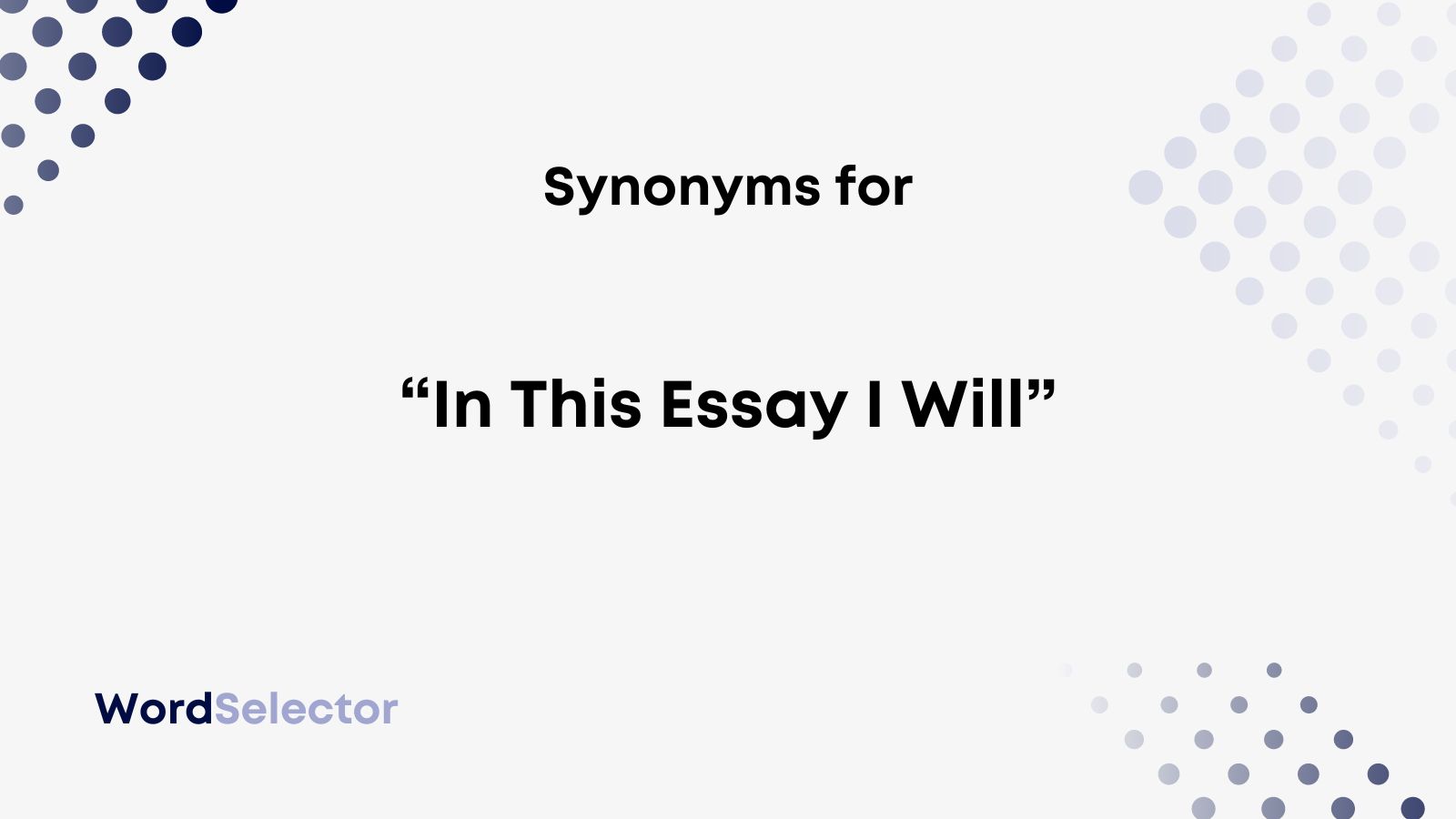
If you’re unsure how to introduce what you will be talking about in an essay, you’ve come to the right place!
In this article, we’ll discuss whether it’s okay to use the phrase “in this essay I will” as an introduction. Moreover, we’ve provided a list of alternative phrases you can use instead!
“In This Essay I Will” Synonyms
- The following essay will
- The purpose of this paper is
- In the following essay, I will
- This essay will
- This paper will
- The following paper will
- The aim of this paper is
- The aim of this essay is
- The purpose of this essay is
- This paper aims
- In this paper, I intend to
- The following paper shall
- In this paper, I will
- This study will
- The following dissertation will
- This thesis will
KEY TAKEAWAYS
- It is not bad to introduce a paper with “in this essay I will,” but you should ask your teacher whether they prefer a paper without personal pronouns in it.
- “The following essay” is a great alternative that uses similar words while removing the personal pronoun “I.”
- You can use “the purpose of this paper is” if you want to completely change your phrasing from the original.
Keep reading to see how we use our choice of alternatives for “in this essay I will” in a couple of helpful examples.
After that, we’ll talk about whether it’s a bad idea to use the phrase “in this essay I will” in an academic paper.
The Following Essay Will
Another way to say “in this essay I will” is to say “the following essay will.” This alternative is great for when you’re writing a particularly formal essay.
After all, many academics urge against the use of personal pronouns like “I” in some academic essays. This synonym uses similar words to the original but removes the controversial “I”!
“The following essay will” isn’t an inherently better phrase than “In this essay I will.” However, it is a fact that most markers warn against the use of personal pronouns. Therefore, it’s a safer option if you’re unsure!
Let’s see a couple of examples making use of this alternative:
The following essay will discuss the sociological impacts of neocolonialism in former British colonies.
While both Clapton and Hendrix were self-taught, the following essay will illustrate that both possessed skills that were equal to, if not surpassing, their classically trained counterparts.
The Purpose of This Paper Is
If you’re wondering what to say instead of “in this essay I will,” we’d go with the phrase “the purpose of this paper is.”
This alternative is great if you want to completely alter your choice of words in your introduction. It replaces “essay” with “paper” and removes the personal pronoun “I” to boot!
This makes this synonym a better option than “in this essay I will” if you are unsure whether the marker will penalize you for using personal pronouns.
Finally, consider the following examples to see this phrase in action:
The purpose of this paper is to demonstrate the link between patriarchy and capitalism.
With the following questions in mind, the purpose of this paper is to theoretically unpack Kant’s notion of a “universal and objective law” in light of globalization and arguments for moral relativism.
Is It Bad to Say “In This Essay I Will”?
The phrase “in this essay I will” is not inherently bad . For example, this may be a perfectly acceptable way to start an essay at a high school level.
There are even some higher academic papers that start this way. In general, how one goes about introducing their topic is a matter of preference .
That being said, it’s always a good idea to talk to the person who will be grading your paper before you start. Ask them if it’s okay to use personal pronouns. In recent times, some professors prefer papers written in an accessible way that’s easy for everyone to understand!
Likewise, some teachers would prefer a more formal tone, so using personal pronouns like “I” should be avoided. That’s why we recommend that you always ask before you start!
So, if you’ve found out that “in this essay I will” is acceptable according to your teacher, here are a few variations of this phrase you might try:
- In this essay I will discuss
- in this essay I will be discussing
- in this essay I will argue
It would also be correct to add a comma after “in this essay.” Whether or not you add a comma is a stylistic choice , and some people choose not to for a smoother read. Nonetheless, the following variations would also be correct:
- In this essay, I will show
- In this essay, I will demonstrate
In conclusion, it isn’t necessarily bad to say “in this essay I will” to introduce your paper. However, it’s always good to check with your teacher or professor and find out how formal they want your paper to sound.
If you found our list of synonyms helpful, feel free to bookmark this page!
- 19 Gender-Neutral Alternatives to “Dear Sir or Madam”
- 15 Other Ways to Say “If I Can Be of Further Assistance”
- 15 Other Ways to Say “At Your Earliest Convenience”
- 15 Other Ways to Say “No Need to Apologize”
We are a team of experienced communication specialists.
Our mission is to help you choose the right phrase or word for your emails and texts.
Choosing the right words shouldn't be your limitation!
© WordSelector

20 Synonyms for “In This Essay, I Will”
In the realm of academic and professional writing, the phrase “In this essay, I will ” serves as a common precursor to the main points or arguments that will be presented.
However, employing this phrase repeatedly can render your writing dull and monotonous. To invigorate your prose and captivate your readers, here are 20 vibrant alternatives to infuse energy into your introductory statements.
List of Synonyms for “In This Essay, I Will”
- This essay explores…
- The focus of this essay is…
- Delving into…
- Examining…
- This paper examines…
- The aim of this essay is to…
- Presenting…
- Unveiling…
- Shedding light on…
- Discussing…
- This essay investigates…
- In this exposition…
- Uncovering…
- Dissecting…
- Exploring…
- This piece delves into…
- Revealing…
- Analyzing…
- The purpose of this essay is to…
- This composition addresses…
1. Unveiling
Scenario Example: Subject: Unveiling the Nuances of Modern Poetry
Dear David,
I hope this email finds you well. I’m thrilled to share with you an upcoming essay that delves into the intricacies of contemporary poetry. Unveiling the layers of meaning in these works has been both enlightening and inspiring. In this exploration, we will dissect various poetic forms and their relevance in today’s literary landscape. Stay tuned for more insights!
Best regards, Charles
Additional Insight: Utilizing “unveiling” adds a sense of anticipation, suggesting that the essay will reveal previously hidden insights or perspectives.
2. Presenting
Scenario Example: Subject: Presenting a New Perspective on Climate Change
I’m excited to share with you an upcoming essay presenting a fresh take on the pressing issue of climate change. By examining the latest scientific research and policy developments, we aim to shed light on potential solutions and actionable steps for a sustainable future. I find the intersection of science and policy in this context really interesting.
Warm regards, Charles
Additional Insight: “Presenting” implies a formal introduction of ideas or arguments, signaling to readers that they are about to embark on a structured exploration of the topic.
3. Shedding Light On
Scenario Example: Subject: Shedding Light On the Ethics of Artificial Intelligence
I’m reaching out to share an upcoming essay dedicated to shedding light on the ethical implications of artificial intelligence (AI) technologies. This essay demonstrates the critical importance of considering ethical frameworks in the development and deployment of AI systems. The key factors are ensuring accountability and transparency in AI decision-making processes.
Additional Insight: “Shedding light on” conveys the idea of illuminating previously obscure or overlooked aspects of a topic, inviting readers to gain new understanding and insight.
4. Analyzing
Scenario Example: Subject: Analyzing Cultural Identity in Literature
I’m thrilled to inform you about an upcoming essay analyzing the portrayal of cultural identity in contemporary literature. Through close examination of character dynamics and narrative techniques, we will delve into the complexities of identity formation and representation. I find the intersection of culture and literature really interesting.
Additional Insight: “Analyzing” suggests a rigorous examination and interpretation of data or phenomena, indicating that the essay will offer insightful interpretations and conclusions.
5. Revealing
Scenario Example: Subject: Revealing the Mysteries of Quantum Physics
I’m excited to share with you an upcoming essay dedicated to revealing the fascinating world of quantum physics. By exploring foundational principles and recent breakthroughs in the field, we aim to demystify complex concepts and make them accessible to all readers. I find the paradoxes of quantum mechanics really interesting.
Additional Insight: “Revealing” suggests a process of uncovering or disclosing previously unknown or misunderstood information, enticing readers with the promise of new discoveries.
6. Examining
Scenario Example: Subject: Examining the Evolution of Human Rights
I’m pleased to inform you about an upcoming essay examining the historical evolution of human rights discourse. Through a chronological analysis of key milestones and movements, we will trace the development of human rights principles and their impact on global governance. The key factors are understanding the socio-political contexts that shape our understanding of human rights.
Additional Insight: “Examining” conveys a sense of thorough investigation and scrutiny, suggesting that the essay will explore different facets of the topic in detail.
7. Delving Into
Scenario Example: Subject: Delving Into the Psychology of Decision Making
I’m reaching out to share an upcoming essay dedicated to delving into the intricate mechanisms of human decision-making. By drawing on insights from psychology and behavioral economics, we will explore the cognitive biases and heuristics that influence our choices. I find the intersection of psychology and decision theory really interesting.
Additional Insight: “Delving into” suggests a deep exploration or immersion into a subject, indicating that the essay will provide in-depth analysis and insights.
8. Uncovering
Scenario Example: Subject: Uncovering the Origins of Mythological Archetypes
I’m excited to share with you an upcoming essay focused on uncovering the ancient origins of mythological archetypes. Through comparative analysis of myths from different cultures, we will trace the common motifs and symbols that underpin human storytelling. I find the universal themes in mythology really interesting.
Additional Insight: “Uncovering” implies a process of revealing hidden or obscured knowledge, suggesting that the essay will offer new perspectives or interpretations.
9. Exploring
Scenario Example: Subject: Exploring the Role of Technology in Education
I’m pleased to inform you about an upcoming essay exploring the transformative role of technology in modern education. By examining case studies and educational theories, we will investigate the benefits and challenges of integrating technology into teaching practices. The key factors are fostering innovation and enhancing learning outcomes.
Additional Insight: “Exploring” conveys a sense of curiosity and open-minded inquiry, indicating that the essay will consider different viewpoints and possibilities.
10. Dissecting
Scenario Example: Subject: Dissecting the Anatomy of a Scientific Breakthrough
I’m thrilled to share with you an upcoming essay dedicated to dissecting the intricate process of scientific discovery. By analyzing landmark studies and breakthrough moments, we will uncover the underlying principles and methodologies that drive innovation in science. I find the intersection of scientific inquiry and creativity really interesting.
Additional Insight: “Dissecting” suggests a methodical and systematic examination of a subject, indicating that the essay will break down complex concepts into comprehensible components.
11. Discussing
Scenario Example: Subject: Discussing the Future of Renewable Energy
I’m reaching out to share an upcoming essay focused on discussing the future prospects of renewable energy technologies. By considering environmental, economic, and political factors, we will explore the opportunities and challenges in transitioning to a sustainable energy paradigm. I find the intersection of technology and environmental stewardship really interesting.
Additional Insight: “Discussing” implies a conversational tone, suggesting that the essay will engage readers in a dialogue about the topic at hand.
12. Investigating
Scenario Example: Subject: Investigating the Impact of Social Media on Mental Health
I’m excited to inform you about an upcoming essay investigating the complex relationship between social media usage and mental health outcomes. Through empirical research and psychological theories, we will examine the potential benefits and drawbacks of online social networking. Both sides of the argument will be explored to provide a comprehensive understanding of this phenomenon.
Additional Insight: “Investigating” conveys a sense of inquiry and exploration, suggesting that the essay will seek to uncover empirical evidence and causal relationships.
13. Examining
Scenario Example: Subject: Examining the Intersection of Art and Activism
I’m pleased to share with you an upcoming essay dedicated to examining the symbiotic relationship between art and activism. Through case studies and cultural analysis, we will explore how artists use their creative expression to effect social change. My personal reflections on this topic have been deeply insightful.
Additional Insight: “Examining” conveys a sense of critical analysis and scrutiny, suggesting that the essay will evaluate different perspectives and interpretations.
14. This Essay Demonstrates
Scenario Example: Subject: This Essay Demonstrates Effective Leadership Strategies
I’m reaching out to share an upcoming essay that demonstrates effective leadership strategies in diverse organizational contexts. By drawing on management theories and real-world examples, we will showcase the key attributes and behaviors of successful leaders. I find the intersection of leadership and organizational behavior really interesting.
Additional Insight: “This essay demonstrates” directly asserts the purpose and scope of the essay, indicating that it will provide concrete examples and evidence to support its claims.
15. My Personal Reflections
Scenario Example: Subject: My Personal Reflections on Travel Writing
I’m excited to share with you an upcoming essay featuring my personal reflections on the art of travel writing. Through introspection and narrative storytelling, I will recount my experiences exploring different cultures and landscapes. I find the intersection of travel and literature really interesting.
Additional Insight: “Personal reflections” adds a subjective dimension to the essay, inviting readers to connect with the author on a more intimate level.
16. The Purpose of This Essay Is To
Scenario Example: Subject: The Purpose of This Essay Is To Explore Economic Inequality
I’m pleased to inform you about an upcoming essay exploring the pervasive issue of economic inequality in modern society. The purpose of this essay is to shed light on the root causes and consequences of unequal distribution of wealth and resources. Stay tuned for a comprehensive analysis of this pressing social issue.
Additional Insight: “The purpose of this essay is to” provides a clear statement of intent, guiding readers on what to expect from the ensuing discussion.
17. This Composition Addresses
Scenario Example: Subject: This Composition Addresses the Role of Gender in STEM Fields
I’m thrilled to share with you an upcoming essay that addresses the persistent gender disparities in STEM (Science, Technology, Engineering, and Mathematics) fields. Through empirical research and sociological analysis, we will examine the barriers faced by women and non-binary individuals in pursuing careers in STEM. I find the intersection of gender studies and STEM education really interesting.
Additional Insight: “This composition addresses” emphasizes the thematic focus of the essay, signaling to readers the specific aspect of the topic that will be explored.
18. The Focus of This Essay Is
Scenario Example: Subject: The Focus of This Essay Is on Environmental Conservation
I’m excited to share with you an upcoming essay focused on the urgent need for environmental conservation and sustainable resource management. Through case studies and policy analysis, we will explore innovative solutions to address pressing environmental challenges. The key factors are promoting biodiversity and mitigating climate change impacts.
Additional Insight: “The focus of this essay is” directs readers’ attention to the central theme or topic that will be explored in depth.
19. Both Sides of the Argument Will Be Explored
Scenario Example: Subject: Both Sides of the Argument Will Be Explored in the Gun Control Debate
I’m pleased to inform you about an upcoming essay that explores the contentious issue of gun control from multiple perspectives. Both sides of the argument will be explored, examining the constitutional rights of gun ownership alongside concerns about public safety and mass shootings. I find the intersection of law and public policy really interesting.
Additional Insight: “Both sides of the argument will be explored” signals to readers that the essay will present a balanced and comprehensive analysis of differing viewpoints.
20. I Find… Really Interesting
Scenario Example: Subject: I Find Quantum Computing Really Interesting
I’m reaching out to share an upcoming essay where I find the field of quantum computing particularly fascinating. By unpacking complex concepts such as superposition and entanglement, we will explore the revolutionary potential of quantum technologies. Stay tuned for an engaging discussion on the future of computing.
Additional Insight: “I find… really interesting” adds a personal touch to the introduction, conveying the author’s enthusiasm and passion for the topic.
Pros and Cons of Utilizing Alternative Introductions
While employing diverse introductions can enhance the readability and engagement of your writing, it’s essential to consider the pros and cons of each approach.
- Enhanced Engagement: Alternative introductions can captivate readers’ attention and encourage them to delve deeper into the essay.
- Variety: Diverse introductions prevent monotony and add dynamism to your writing, catering to different audiences and preferences.
- Clarity: Clear and concise introductions provide readers with a roadmap of what to expect in the essay, guiding their understanding and comprehension.
- Overuse: Excessive variation in introductions may distract from the main content of the essay, leading to confusion or disorganization.
- Inconsistency: Inconsistent use of introductions may disrupt the flow of the writing and undermine its coherence and cohesion.
- Subjectivity: Personal preferences for specific introductions may vary among readers, making it challenging to appeal to everyone’s tastes.
While incorporating alternative introductions can enrich your writing and engage your audience, it’s essential to strike a balance and consider the context and audience expectations when selecting introductory phrases. By leveraging a diverse range of introductions, you can effectively convey your ideas and captivate your readers’ interest.

Dariel Campbell is currently an English instructor at a university. She has experience in teaching and assessing English tests including TOEFL, IELTS, BULATS, FCE, CAE, and PTEG . With over a decade of teaching expertise, Dariel Campbell utilizes his knowledge to develop English lessons for her audience on English Overview.
Leave a Comment Cancel reply
You must be logged in to post a comment.
Welcome to The English Overview, where we help to improve your language skills. Explore lessons on words, sentences, punctuation, and more. Enhance your English fluency and easily create powerful expressions. Come along on a journey to become excellent in language.
Privacy Policy
Latest Articles

Matching Christmas Jumpers: Why They’re Perfect for Families
September 24, 2024

Boost Your Business with Professional Employer Organization Support

Unlocking the Mysteries: How Tarot Cards Can Reveal Your Future
© 2024 English Overview

What Is Another Way to Say “In This Essay, I Will”?
April 6, 2023
Kahlan House
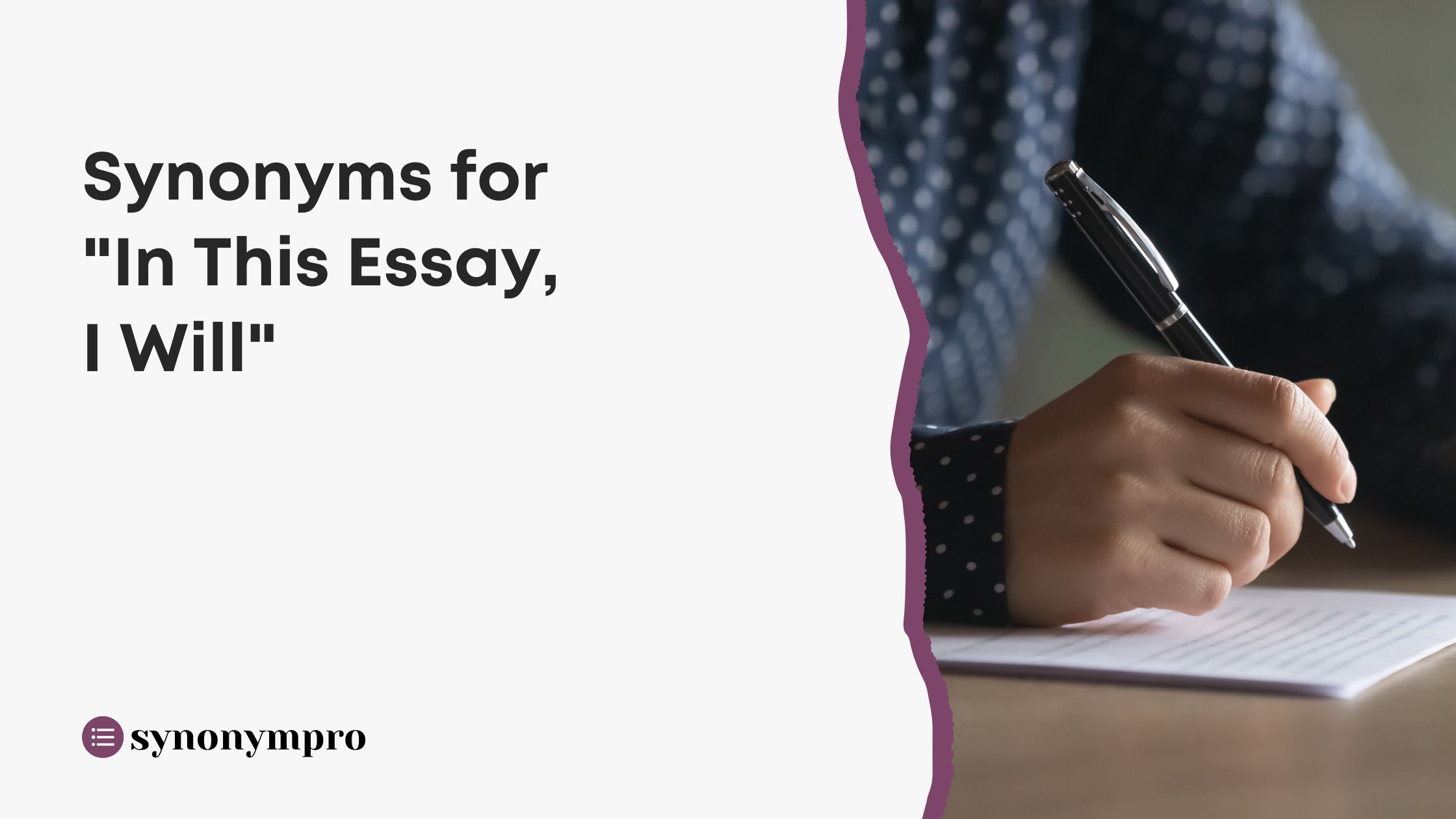
It’s time to write that dreaded essay that makes up 50% of your grade. Knowing how to start is the most difficult part, but is in this essay, I will a suitable way to introduce your topic?
In this article, we’ll show you what to say instead of in this essay, I will . In particular, we’ll provide 10 suitable ways to start an academic paper, so read on!
10 Alternative Ways to Say “In This Essay, I Will”
Below, you’ll find 10 other ways to say in this essay, I will in an academic paper:
- The aim of this essay
- The following essay will
- The purpose of this paper is
- In this paper, I intend to
- This essay will
- The following paper shall
- This study will
- The following dissertation will
- This thesis will
- This paper aims
1. The Aim of This Essay
You can use the aim of this essay to introduce your topic without including the personal pronoun “I.”
This phrase is perfect for a research paper in which you are trying to prove some hypothesis with your data. This would be the “aim” mentioned in this phrase.
Check out the examples below to see what we mean:
The aim of this paper is to prove the existence of the majestic yeti using thorough data collected from the Himalayan mountains.
With the above in mind, the aim of this paper is to reformulate human conceptions of justice with a particular focus on Western legal systems.
2. This Paper Aims
This paper aims is simply a more concise version of the phrase above. You can use either version interchangeably.
However, if you’re close to reaching your maximum word count , you should probably go for this variation instead.
Let’s see it in an example or two:
This paper aims to disprove Shrier’s claims and offer a less detrimental alternative to the issues she addresses.
In addition to providing an alternative viewpoint on the matter of “gentle parenting,” this paper aims to direct parents to more modern resources on the topic of parenting in general.
3. The Following Essay Will
Like in this essay, I will , another phrase that removes the need for personal pronouns is the following essay will .
You can use this phrase in any kind of essay, but you will see it most frequently in the introduction of a discursive essay . By that, we mean it suits an essay that argues a particular point using facts and logical reasoning.
Consider the examples below:
The following essay will be discussing the impacts of deforestation on the African Tree Toad.
Although it is commonly argued that modern news outlets are “no longer trustworthy,” the following essay will demonstrate how political agendas have influenced the content of newspapers throughout history.
4. The Purpose of This Paper Is
It is also possible to set out not what your paper intends to do, but what its overall purpose is. You can state this using the phrase the purpose of this paper is.
This is a great phrase to use in a research paper where you are trying to exhibit a particular point using data.
For instance:
The purpose of this paper is to exhibit the link between childhood exposure to lead paint and the inability to regulate emotions in adulthood.
Having set out the parameters of this experiment, I will now discuss the purpose of this paper , which is to disprove Peterson’s brash statements about the nature of masculinity.
5. This Essay Will
Instead of stating that you will address something in a paper, you can remove the personal pronouns and simply state that this essay will address something.
This is a very quick and easy way to remove the personal pronouns in in this essay, I will if you already had a draft done that included the original phrase.
Check out the examples below:
This essay will consider the similarities between Brontë’s Heathcliff and the classic Byronic hero.
In addition to arguing for the inclusion of critical thinking classes at primary school level, this essay will demonstrate the benefit of these classes on the overall cognitive abilities of children aged 8 and upwards.
6. The Following Paper Shall
The following paper shall is just a more formal version of the phrase above.
Therefore, you can use it if you believe a very formal register would be preferred by your professor. Or, if you want to sound especially sophisticated for no particular reason.
Have a look at these examples:
The following paper shall discuss the importance of exposure to music in a child’s formative years.
I shall address the key concerns raised by congress members in the following paper .
7. This Study Will
A “study” is essentially a compilation of research and a report that relates to said research. Therefore, if the paper you are working on is very research-based, you could call it a “study” and make use of the phrase this study will .
This phrase has the same effect as the others on our list, in that it removes any personal pronouns and focuses on what the paper itself will demonstrate.
Let’s see an example making use of this phrase:
This study will probe into the question of whether the Earth could survive without mosquitoes.
This study will address how historical atrocities create a lasting legacy for previously disempowered groups.
8. In This Paper, I Intend to
If your professor is happy for you to use personal pronouns in your essay, you can switch up your wording with the phrase in this paper, I intend to .
This is an especially good phrase if you feel that in this essay, I will is starting to feel a bit worn out.
See how we’ve used it in an example:
In this paper, I intend to address the psychological impacts of social media on pre-pubescent youths.
In the first half of this paper, I intend to define my terms and my parameters before moving on to the crux of my topic in the second half.
9. The Following Dissertation Will
A “dissertation” is a lengthy paper that you write in order to obtain a Ph.D. Therefore, you could use the following dissertation will if your paper fits the parameters of a dissertation.
This may simply be a more accurate way to describe the nature of your paper, although it is normal to call a dissertation an “essay” as well.
See this phrase in a few examples:
The following dissertation will address the key issues facing the American court system and discuss both views regarding whether the Constitution should be capable of alteration.
Although research in this area has pointed to aggressive behavior being linked to neurology, the following dissertation will argue that most manifestations of aggression are socialized.
10. This Thesis Will
A “thesis” is a long paper that students frequently write to complete a degree program. Therefore, you can use the phrase this thesis will instead of this essay will to be more specific.
Have a look at the examples below:
This thesis will discuss public reactions to Milton’s representation of Lucifer at the time of the epic poem’s publishing.
After a brief unpacking of the terms used herein, this thesis will argue for an increased focus on sustainable fashion in North America.
Is It Correct to Say “In This Essay, I Will”?
The phrase in this essay, I will is perfectly correct , and it is not a bad way to start off an academic paper, particularly at a high-school level.
You can use this phrase in college essays as well. However, some academics prefer that an essay doesn’t contain any personal pronouns like “ I .” Therefore, you should check with the person marking your paper before using this phrase.
Let’s look at a couple of examples illustrating how you can use this phrase:
In this essay, I will discuss the impacts of Artificial Intelligence on the publishing industry.
In this essay, I will argue that using more sustainable modes of energy will have no negative impacts on a country’s economy.
Although in this essay, I will is a correct phrase that students use commonly in academic papers, it may be rather standardized . Furthermore, many academics disagree with the use of personal pronouns in essays.
If your professor is one of these academics, you may need to find an alternative phrase to use. Luckily, you can use our list of great alternative ways to introduce the topic of your paper, both with personal pronouns and without.
Related posts:
- How to Write a Follow-up Email for a Letter of Recommendation
- Another Way to Say “Please Don’t Hesitate to Contact Me”
- What Is Another Way to Say “Correct Me if I’m Wrong”?
- What Is Another Way to Say “Sorry to Hear That”?
- What Is Another Way to Say “Next Steps”?
- What Is Another Way to Say “Family Emergency”?
- What Is Another Way to Say “Have a Great Rest of Your Day”?
- What Is Another Way to Say “Thank You for Taking the Time”?
- What Is Another Way to Say “Thank You for the Update”?
- What Is Another Way to Say “Talk to You Then”?
[email protected]
We help you expand your vocabulary and improve your understanding of the English language.
© SynonymPro
Better Phrases
Web-Search ·
What are some effective alternatives to the phrase "In this essay, I will discuss..." that can enhance the quality of my writing?
Instead of using the phrase "In this essay, I will discuss...", you can employ alternative phrases that convey the same meaning while adding variety and sophistication to your writing. Here are some alternative ways to introduce the main topic or argument of your essay:
- "This essay aims to explore/discuss/analyze..."
- "The focus of this essay is on..."
- "The purpose of this essay is to examine/evaluate..."
- "In the following pages, I will examine/discuss..."
- "This paper will delve into the topic of..."
- "The central theme of this essay revolves around..."
- "The objective of this essay is to shed light on..."
- "Through this essay, I intend to explore/analyze..."
- "The main argument presented in this essay is..."
- "This essay seeks to address the question of..."
Remember, the key is to choose a phrase that accurately reflects the content and purpose of your essay while maintaining a professional and academic tone.
Learn more:
- 20. Academic Tone and Language
- “In this essay I will argue…” | Gavin's Grammartorium
- In This Essay I Will Discuss The Argument Of Should All | Bartleby
- A Beginner’s Guide to IELTS
- Common Grammar Mistakes [for IELTS Writing Candidates]
Writing Correction Service
- Free IELTS Resources
- Practice Speaking Test
Select Page
IELTS Discussion Essays [Discuss Both Views/Sides]
Posted by David S. Wills | Jun 14, 2021 | IELTS Tips , Writing | 3
In this lesson, I’m going to explain what an IELTS discussion essay is and how you can write a good one. I will talk about structure and content, as well as looking briefly at discussion essay thesis statements, which many people find tricky. I’ve also written a sample essay, which you can find at the bottom of this page.
What is a Discussion Essay?
As the name suggests, a discussion essay is an essay that discusses things! More specifically, it is a type of IELTS writing task 2 essay that requires you to look at two different points of view . You can easily recognise these essays by the following phrase:
Discuss both views and give your opinion.
Sometimes it is phrased a little differently. It might say:
Discuss both sides and give your opinion
Discuss both points view and give your opinion
The important thing is that these all mean the same. When you see any of these, you know that you need to write a discussion essay. Importantly, this instruction tells you that you need to do two things:
- Discuss both views (there will have been 2 views mentioned in the previous sentence(s))
- Give your opinion (i.e. state which view you agree with)
If you failed to do either of these things, you would not have satisfied the basic criteria for Task Achievement .
Example Discussion Essay Questions
Here is a list of 5 discussion essay questions either from the IELTS exam, reportedly from the IELTS exam, or from reputable publications that have copied the IELTS question style. (Not that you absolutely should avoid fake IELTS questions when practising.)
Some people say that parents should encourage their children to take part in organised group activities in their free time. Others say that is important for children to learn how to occupy themselves on their own. Discuss both views and give your own opinion.
Some people prefer to spend their lives doing the same things and avoiding change. Others, however, think that change is always a good thing. Discuss both views and give your opinion.
Some people feel that manufacturers and supermarkets have the responsibility to reduce the amount of packaging of goods. Others argue that customers should avoid buying goods with a lot of packaging. Discuss both views and give your opinion.
Some people believe that higher education should be funded by the government. Others, however, argue that it is the responsibility of individuals to fund their higher education. Discuss both views and give your opinion.
Some people believe that it is important for children to attend extra classes outside school, while others believe that they should be allowed to play after school. Discuss both views and give your own opinion.
You can see in these questions that there is a similar pattern. In each case, the question phrase (“Discuss both views and give your own opinion”) is the same and in the previous sentence or sentences, there are two opposing views. This, then, makes “discuss both views” questions a sort of opinion essay .
How to Answer IELTS Discussion Questions
First of all, it is important when answering any IELTS task 2 question that you read the question carefully so that you understand it, then provide an answer that directly responds to the question, following its instructions carefully.
As discussed above, you are required to do two things: 1) Discuss both views, and 2) Give your own opinion. You absolutely must do both of those. It doesn’t really matter what your opinion is or whether you give equal weighting to both sides of the argument. Instead, you must cover both sides and also give some sort of opinion. (It is important, though, according to the marking rubric , that you are consistent in your opinion.)
Your answer of course should be structured carefully so as to present your ideas in a thoroughly logical way that is easy for your reader to interpret. I almost always use a four-paragraph structure in my essays, but some people prefer to use five paragraphs in this sort of essay. The difference would look like this:
| Four-paragraph essay | Five-paragraph essay | |
| Introduction | Introduce the main idea State your opinion | Introduce the main idea State your opinion |
| Body paragraph 1 | Discuss the first point of view | Discuss the first point of view |
| Body paragraph 2 | Discuss the second point of view | Discuss the second point of view |
| Body paragraph 3 | – | Give your opinion |
| Summarise the issue and reaffirm position | Summarise the issue and reaffirm position |
You might be wondering why I have given my opinion in the body of the five-paragraph essay but not in the four-paragraph essay. Well, actually I would give my opinion in the body of both. However, my opinion would be more subtly woven into the text of the four-paragraph essay. I personally find this to be a better method, but it is equally possible that you could write an amazing five-paragraph essay. That issue is discussed further in this video:
Discussion Essay Thesis Statement
In academic writing, a thesis statement (sometimes called an essay outline ) is the part of the essay where you insert your opinion. It typically comes at the end of the introduction and guides the reader by explaining your opinion on the issues that have been introduced.
But do you really need to provide one in such a short essay? Well, a 2018 study into successful IELTS essays concluded that thesis statements were “obligatory” – i.e. you absolutely do need one. In fact, that study found that thesis statements appeared in 100% of successful IELTS discussion essays! Therefore, we can conclude they are very important.
Because a discussion essay will tell you to “Discuss both views and give your opinion,” you must introduce the two views and then give your opinion in the introduction. Here is an example:
Introductory paragraph:
In some parts of the world, children are forced to go to cram schools and other facilities of extracurricular learning, but many people believe that this is unfair and that they should be allowed to enjoy their free time instead. This essay will look at both perspectives and then conclude that it is indeed unfair.
My first sentence clearly introduces two different ideas:
- Children should do extra classes
- Children should not do extra classes
Note how I have successfully used synonyms to avoid repeating anything from the question. I have also framed the issue in a new way so that I am not just paraphrasing. (You can learn why paraphrasing is not always helpful here .)
My second sentence is the thesis statement. In this sentence, I outline what the essay will do (“look at both perspectives”) and then give my opinion (“it is unfair”). This is a simple but effective thesis statement.
Thesis Statement Advice
Your IELTS discussion essay thesis statement should do two things:
- Tell the reader what the essay will do
- Present your opinion
Because this is a formal essay, it is best not to be too personal. Instead of saying “I will…” or “I think…” it is better to say “This essay will…” Here are some simple templates that you can follow most of the time:
- This essay will look at both sides and then argue that…
- This essay will discuss both views but ultimately side with…
Just make sure to avoid being overly vague. You are required to give your opinion consistently throughout the essay, so don’t say “This essay will look at both sides and then give my opinion .” It is not really the best approach because the examiner wants to see that you can be consistent in presenting an opinion. That is clearly stated in the marking rubric. For band 7, it says:
- presents a clear position throughout the response
It could be concluded, then, that your opinion is not clear from the start and so you have not done enough to warrant a band 7 for Task Achievement.
Body Paragraphs
As I mentioned above, there are really two main approaches you could take to the body paragraphs:
- Discuss one view per paragraph and incorporate your opinion into each.
- Discuss one view per paragraph and then have another for your opinion.
I suppose there is also a third option:
- Compare and contrast the two viewpoints in each paragraph.
This last one may be a little harder to do successfully without jeopardising your score for Task Achievement or Coherence and Cohesion , but advanced candidates may find it useful.
Remember that there is no single perfect formula for an IELTS essay. That’s not how languages work and that’s not how IELTS works. Different people could come up with different ways to present a successful essay. The most common essay structures are mere guidelines for particularly useful methods of approaching an essay.
Does a Discussion Essay Have to be Balanced?
Because the question says “Discuss both views,” it is quite logical to think that you must provide some degree of balance, but you certainly don’t need to give equal weighting to both sides. Remember that you are also going to give your opinion, so if you come down strongly on one side of the issue, it might be odd to give equal attention to both.
If you do feel very strongly about one side, you might want to present your discussion of the other side as quite negative. However, IELTS is a thinking exam as well as an English exam and an intelligent person can always look at both sides of an issue and explain – at the very least – why someone might believe a thing that is different to his own view. This seems quite important, but there is nothing explicitly mentioned in the marking rubric.
I would suggest that if you think a two-sided issue is basically one-sided (i.e. you strongly disagree with the other view), you should still write one or two sentences about why people believe that and then devote the rest of your essay to disputing their view.
Another approach is to write BP1 as a very short paragraph that explains why people might think one thing, but then have BP2 as a very long paragraph that debunks the opposing view and then explains why the other is correct.
(You can read more about IELTS essays and balance here .)
Sample Answer
Here is my full sample answer to the above question about whether or not children should be made to do extracurricular activities:
In some parts of the world, children are forced to go to cram schools and other facilities of extracurricular learning, but many people believe that this is unfair and that they should be allowed to enjoy their free time instead. This essay will look at both perspectives and then conclude that it is indeed unfair. In countries like South Korea, most children are made to go to an array of cram schools outside of regular school hours. Their parents do this in order to give their child a better future because it helps the child to learn more and thus gives them the academic advantages needed to apply to the best universities or jobs in future. These schools often provide children with an advantage over their peers because they improve their foreign language or math skills more quickly, and thus the children who do not attend these schools might have comparatively poor grades. However, whilst this attitude may result in better academic performance, it is certainly not good for the mental health of these children. It is no coincidence that places like South Korea have the highest rates of suicide among their young populations. The fact is that children are not equipped to spend fourteen or sixteen hours per day in classrooms, memorising facts and figures. In a sense, it is a form of child abuse. Children should be allowed to go home and spend time with friends and family to build social skills. They should be allowed to occupy themselves in order to become more creative and learn how to understand their own mind instead of being trained to repeat what they are told. In conclusion, it is understandable that some parents want their children to go to extra classes, but this is damaging to children and they should be given the freedom to play and socialise outside of regular school hours.
In BP1, I have looked at the topic of cram schools (ie the side of the argument in favour of extra lessons). I explored why parents might want their kids to do this and show the supposed benefits. Note that I never embraced any of these benefits. I was careful to use language that distanced these ideas from my own opinion, which was the opposite, so I said “Their parents do this in order to…”
In BP2, I looked at the opposite side. I was careful to make sure that my first sentence linked to the previous paragraph, highlighting that the benefits are quite minor compared to the drawbacks. All of my sentences here justify my position, which is that it is cruel to force these extra lessons on children.
My conclusion ties all of this together. The first clause references BP1 and the second summarises the main argument in BP2.
You can find two more sample essays here:
- A discussion essay about sports facilities
- A discussion essay about sports abilities
About The Author
David S. Wills
David S. Wills is the author of Scientologist! William S. Burroughs and the 'Weird Cult' and the founder/editor of Beatdom literary journal. He lives and works in rural Cambodia and loves to travel. He has worked as an IELTS tutor since 2010, has completed both TEFL and CELTA courses, and has a certificate from Cambridge for Teaching Writing. David has worked in many different countries, and for several years designed a writing course for the University of Worcester. In 2018, he wrote the popular IELTS handbook, Grammar for IELTS Writing and he has since written two other books about IELTS. His other IELTS website is called IELTS Teaching.
Related Posts
How to Write an Introduction for IELTS Writing Task 2
July 8, 2021
Sentence Completion Tips for IELTS Reading
May 13, 2017
Describe a Neighbourhood [IELTS Speaking]
July 11, 2022
8 IELTS Reading Tips
January 24, 2022
It is sometimes debatable whether asking children to get extra education after school or letting them play that is actually beneficial for them. Even though both viewpoints have benefits and drawbacks but I believe ,in the childhood age, children have to take rough and discipline education after school to be succeed in the future.
To begin with, many educational experts believe that playing is one of the essential aspects that have to be gotten by children to grow and happy. By using the playing approach, children can have a good mental and psychic health. Besides, letting children play after school can also support them to increase their emotional stimuli and get a positive social interaction. With this way, experts believe children can grow as a better adult in the future and have a freedom to get a better life in the upcoming times.
However, I completely contra with the first idea because I believe childhood is a better time to train children about academic or other skills that benefits them in the future. Based on scientific journal that I read, the ability of children in learning new things are more spectacular compared to adults. A lot of artists, scientist, and even football player who currently becoming a superstar in this era is a string of process that is began since their in the childhood. For instance, nowadays, I am working in the field of election supervision, it because since in my childhood my father love to force me learning about social and political issues by getting additional class. Thus, making children to get extra class after school is an appropriate preference if parents desire to see their son getting a good future.
To conclude, based on experts children have to get a freedom to play after schools but in my viewpoint it will be more advantages if they utilize the playing time with joining additional class after school.
VERY GOOD MR DIRWAN But actually you mixed both of the ideas , you need to take one side for this sort of essay writting, as it is mentioned in the above instruction. By the way WELL DONE . love from Pakistan to my sweet brother.
I have not checked in here for some time because I thought it was getting boring, but the last few posts are really great quality so I guess I’ll add you back to my everyday bloglist. You deserve it my friend. ??
Leave a reply Cancel reply
Your email address will not be published. Required fields are marked *
This site uses Akismet to reduce spam. Learn how your comment data is processed .
Download my IELTS Books
Recent Posts
- Cambridge IELTS 19 – Sample Answers
- Commas and Time Phrases
- Ambition and Success: Sample IELTS Essay
- Do the Advantages Outweigh the Disadvantages? – Advice About This Question Type
- Exams vs Continual Assessement [Model Essay]
Recent Comments
- David S. Wills on Writing Correction Service
- raquel on Writing Correction Service
- Lesson Plans
- Model Essays
- TED Video Lessons
- Weekly Roundup
- Help Center
Synonyms for In this essay
69 other terms for in this essay - words and phrases with similar meaning.
Alternatively

Enter any word, phrase or sentence to rewrite:
HINT: Try a simple phrase in the context of a longer sentence and see how it turns out!
Word and Phrase Examples:
- a back to the basics kin ...
- a blanket generalization
- a cat in gloves gets no ...
- babes in the woods
- back from the dead
- back in the day
- back into place
- call a truce
- call it a day
- call it a night
- call it quits
- dance around one's probl ...
- dance around the issues
- dance to the beat of one ...
- each step of the way
- early bird specials
- easy breezy
- face to face
- fall asleep at the wheel
- fall by the wayside
- falling apart at the sea ...
- game of chance
- gas guzzler
- gas guzzling
- hand in hand
- hang one's head in embar ...
- hanging out
- I am tracking with you
- I can't help but questio ...
- I do the best I can
- jack of all trades
- Jeff simply goes through ...
- Jill can finally be at p ...
- johnny come latelies
- keen interest
- keep an eye out
- keep focus on the end go ...
- large and in charge
- largely mostly
- last acts of desperation
- last but not least
- made some major strides ...
- maintain a specific leve ...
- make a decision
- make a difference
- national security
- never give up
- new and improved
- occasionally
- odd man out
- of a single mind
- painstaking
- painstakingly
- pale as a ghost
- pale as death
- quality of life
- quick and dirty
- rabble rousers
- race against time
- raise awareness
- raise money
- sales figures
- sales numbers
- take a hard left
- take a hard line
- take a header
- take a major leap of fai ...
- unanimously
- valuable asset
- very different
- very important
- wait and see
- walk the line
- warms my heart
- waste of breath
- yada yada yada
- yank someone's chain
- Zain encourages people t ...
- zany zebras zig zagged
- zest for life
Browse Word Or Phrase Examples by First Letter:
A - B - C - D - E - F - G - H - I - J - K - L - M - N - O - P - Q - R - S - T - U - V - W - X - Y - Z

Word choice in essays: should I use "will" or "would"
For example: “I will join this club” versus “I would join this club”
For every college essay, should I be writing in a manner that assumes my acceptance?
I would join X club.
@Dustyfeathers really? A lot of people tell me to use “will”
@doorrealthe “will” makes it seem like you think you’re a shoe-in. “would” shows that you understand that you’re not guaranteed
Would seems to be better grammar. Will seems to be more “assume my acceptance.”
It’s up to you.
It’s not a terrible thing to be gentile and say “would.” There’s something comforting about that usage for the reader. It allows them space.
There’s also no wrong in saying “will” do something–unless it feels overly brash to you. Somewhat salesman-like.
My preference is for the gentile and more grammatically correct. Truthfully if you have a strong-enough application either one will work. No one will ding you for verb choice over substance.
Gentile? Are you sure that’s the word you mean to use? Do you mean genteel? Very different meanings!
@jym626 I think OP means gentile as in polite, and not harsh/arrogant.
I’d use “would” or maybe something like “I plan to”. I think that’s firm enough without assuming you’re getting in.
That word is gelteel. NOT gentile. A gentile is a person who is not Jewish!
I think he meant to say gentle hahaha @jym626
Either gentle or Genteel would work. Not Gentile! But he spelled it wrong twice i
Oops, I think it’s gentle too, you’re right @Jpgranier
Interesting because a lot of teachers and tutors back in high school favored “will” over “would” in these cases because it shows your bravery and commitment.
As always, it’s up to you, but if I were you, I would say “I will join the club.”
@HardOREasy I used a paid writing tutor (A PhD upper level English professor at a top 50 school) and she told me to phrase all the future things I would do at the school as, “I hope to…”
Lost in this conversation is @dragonfly26 ’s great advice: “I plan to.” I highly recommend using that.
*Will = overconfidence *Would = acceptable, but it seems sort of hesitant. *I hope to = No. no. no.
Bottom line: It matters little. What will matter is all the other words you choose to use. An adcom isn’t going to parse between “will”, “would”, “hope to” and “plan to”. It’s semantics and given the number of applications and essays to read, I think it matters very little what word choice you use amongst these options.
Ditto what @doschicos said. Many essays are quickly scanned by readers. Subtle wording probably does not matter. Personally, I’d use “hope to” or “plan to” as you show intent, but honestly, you cannot commit to anything. Just don’t use “gentile” unless you want to give the reader a good laugh.
I don’t like “will” because, in most cases, you won’t choose to attend the school even if they accept you. But it’s a small thing.
I don’t necessarily disagree, but why?
Will and plan imply you’ve got a crystal ball. Would is nicely conditional, but again, how do you know? Hope seems to reflect some uncertainty.
I think I’d go with, “I’m interested in,” but not just naming it, like a list. I; have a few words of why. But we’re splitting hairs, as doschicos and jym say.
I personally think hope to is acting appreciative if you were given the chance to attend the university. It doesn’t come across as entitled or an assumption you wouldn’t get in.
- +44 (0) 207 391 9032
Recent Posts
- What Is an Adjective: Types, Uses, and Examples
How to Write a Reflective Essay
- Abstract vs. Introduction: What’s the Difference?
- How Do AI detectors Work? Breaking Down the Algorithm
- What is a Literature Review? Definition, Types, and Examples
- Why Is Your CV Getting Rejected and How to Avoid It
- Where to Find Images for Presentations
- What Is an Internship? Everything You Should Know
- How Long Should a Thesis Statement Be?
- How to Write a Character Analysis Essay
- Academic News
- Custom Essays
- Dissertation Writing
- Essay Marking
- Essay Writing
- Essay Writing Companies
- Model Essays
- Model Exam Answers
- Oxbridge Essays Updates
- PhD Writing
- Significant Academics
- Student News
- Study Skills
- University Applications
- University Essays
- University Life
- Writing Tips
17 academic words and phrases to use in your essay
(Last updated: 20 October 2022)
Since 2006, Oxbridge Essays has been the UK’s leading paid essay-writing and dissertation service
We have helped 10,000s of undergraduate, Masters and PhD students to maximise their grades in essays, dissertations, model-exam answers, applications and other materials. If you would like a free chat about your project with one of our UK staff, then please just reach out on one of the methods below.
For the vast majority of students, essay writing doesn't always come easily. Writing at academic level is an acquired skill that can literally take years to master – indeed, many students find they only start to feel really confident writing essays just as their undergraduate course comes to an end!
If this is you, and you've come here looking for words and phrases to use in your essay, you're in the right place. We’ve pulled together a list of essential academic words you can use in the introduction, body, and conclusion of your essays .
Whilst your ideas and arguments should always be your own, borrowing some of the words and phrases listed below is a great way to articulate your ideas more effectively, and ensure that you keep your reader’s attention from start to finish.
It goes without saying (but we'll say it anyway) that there's a certain formality that comes with academic writing. Casual and conversational phrases have no place. Obviously, there are no LOLs, LMFAOs, and OMGs. But formal academic writing can be much more subtle than this, and as we've mentioned above, requires great skill.
So, to get you started on polishing your own essay writing ability, try using the words in this list as an inspirational starting point.
Words to use in your introduction
The trickiest part of academic writing often comes right at the start, with your introduction. Of course, once you’ve done your plan and have your arguments laid out, you need to actually put pen to paper (or fingers to keyboard) and begin your essay.
You need to consider that your reader doesn’t have a clue about your topic or arguments, so your first sentence must summarise these. Explain what your essay is going to talk about as though you were explaining it to a five year old – without losing the formality of your academic writing, of course! To do this, use any of the below words or phrases to help keep you on track.
1. Firstly, secondly, thirdly
Even though it sounds obvious, your argument will be clearer if you deliver the ideas in the right order. These words can help you to offer clarity and structure to the way you expose your ideas. This is an extremely effective method of presenting the facts clearly. Don’t be too rigid and feel you have to number each point, but using this system can be a good way to get an argument off the ground, and link arguments together.
2. In view of; in light of; considering
These essay phrases are useful to begin your essay. They help you pose your argument based on what other authors have said or a general concern about your research. They can also both be used when a piece of evidence sheds new light on an argument. Here’s an example: The result of the American invasion has severely impaired American interests in the Middle East, exponentially increasing popular hostility to the United States throughout the region, a factor which has proved to be a powerful recruitment tool for extremist terrorist groups (Isakhan, 2015). Considering [or In light of / In view of] the perceived resulting threat to American interests, it could be argued that the Bush administration failed to fully consider the impact of their actions before pushing forward with the war.
3. According to X; X stated that; referring to the views of X
Introducing the views of an author who has a comprehensive knowledge of your particular area of study is a crucial part of essay writing. Including a quote that fits naturally into your work can be a bit of a struggle, but these academic phrases provide a great way in.
Even though it’s fine to reference a quote in your introduction, we don’t recommend you start your essay with a direct quote. Use your own words to sum up the views you’re mentioning, for example:
As Einstein often reiterated, experiments can prove theories, but experiments don’t give birth to theories.
Rather than:
“A theory can be proved by experiment, but no path leads from experiment to the birth of a theory.” {Albert Einstein, 1954, Einstein: A Biography}.
See the difference?
And be sure to reference correctly too, when using quotes or paraphrasing someone else's words.
Adding information and flow
The flow of your essay is extremely important. You don’t want your reader to be confused by the rhythm of your writing and get distracted away from your argument, do you? No! So, we recommend using some of the following ‘flow’ words, which are guaranteed to help you articulate your ideas and arguments in a chronological and structured order.
4. Moreover; furthermore; in addition; what’s more
These types of academic phrases are perfect for expanding or adding to a point you’ve already made without interrupting the flow altogether. “Moreover”, “furthermore” and “in addition” are also great linking phrases to begin a new paragraph.
Here are some examples: The dissociation of tau protein from microtubules destabilises the latter resulting in changes to cell structure, and neuronal transport. Moreover, mitochondrial dysfunction leads to further oxidative stress causing increased levels of nitrous oxide, hydrogen peroxide and lipid peroxidases.
On the data of this trial, no treatment recommendations should be made. The patients are suspected, but not confirmed, to suffer from pneumonia. Furthermore, five days is too short a follow up time to confirm clinical cure.
5. In order to; to that end; to this end
These are helpful academic phrases to introduce an explanation or state your aim. Oftentimes your essay will have to prove how you intend to achieve your goals. By using these sentences you can easily expand on points that will add clarity to the reader.
For example: My research entailed hours of listening and recording the sound of whales in order to understand how they communicate.
Dutch tech companies offer support in the fight against the virus. To this end, an online meeting took place on Wednesday...
Even though we recommend the use of these phrases, DO NOT use them too often. You may think you sound like a real academic but it can be a sign of overwriting!
6. In other words; to put it another way; that is; to put it more simply
Complement complex ideas with simple descriptions by using these sentences. These are excellent academic phrases to improve the continuity of your essay writing. They should be used to explain a point you’ve already made in a slightly different way. Don’t use them to repeat yourself, but rather to elaborate on a certain point that needs further explanation. Or, to succinctly round up what just came before.
For example: A null hypothesis is a statement that there is no relationship between phenomena. In other words, there is no treatment effect.
Nothing could come to be in this pre-world time, “because no part of such a time possesses, as compared with any other, a distinguishing condition of existence rather than non-existence.” That is, nothing exists in this pre-world time, and so there can be nothing that causes the world to come into existence.
7. Similarly; likewise; another key fact to remember; as well as; an equally significant aspect of
These essay words are a good choice to add a piece of information that agrees with an argument or fact you just mentioned. In academic writing, it is very relevant to include points of view that concur with your opinion. This will help you to situate your research within a research context.
Also , academic words and phrases like the above are also especially useful so as not to repeat the word ‘also’ too many times. (We did that on purpose to prove our point!) Your reader will be put off by the repetitive use of simple conjunctions. The quality of your essay will drastically improve just by using academic phrases and words such as ‘similarly’, ‘as well as’, etc. Here, let us show you what we mean:
In 1996, then-transport minister Steve Norris enthused about quadrupling cycling trips by 2012. Similarly, former prime minister David Cameron promised a “cycling revolution” in 2013…
Or Renewable Energy Initiative (AREI) aims to bridge the gap of access to electricity across the continent (...). Another key fact to remember is that it must expand cost-efficient access to electricity to nearly 1 billion people.
The wording “not only… but also” is a useful way to elaborate on a similarity in your arguments but in a more striking way.
Comparing and contrasting information
Academic essays often include opposite opinions or information in order to prove a point. It is important to show all the aspects that are relevant to your research. Include facts and researchers’ views that disagree with a point of your essay to show your knowledge of your particular field of study. Below are a few words and ways of introducing alternative arguments.
8. Conversely; however; alternatively; on the contrary; on the other hand; whereas
Finding a seamless method to present an alternative perspective or theory can be hard work, but these terms and phrases can help you introduce the other side of the argument. Let's look at some examples:
89% of respondents living in joint families reported feeling financially secure. Conversely, only 64% of those who lived in nuclear families said they felt financially secure.
The first protagonist has a social role to fill in being a father to those around him, whereas the second protagonist relies on the security and knowledge offered to him by Chaplin.
“On the other hand” can also be used to make comparisons when worded together with “on the one hand.”
9. By contrast; in comparison; then again; that said; yet
These essay phrases show contrast, compare facts, and present uncertainty regarding a point in your research. “That said” and “yet” in particular will demonstrate your expertise on a topic by showing the conditions or limitations of your research area. For example:
All the tests were positive. That said, we must also consider the fact that some of them had inconclusive results.
10. Despite this; provided that; nonetheless
Use these phrases and essay words to demonstrate a positive aspect of your subject-matter regardless of lack of evidence, logic, coherence, or criticism. Again, this kind of information adds clarity and expertise to your academic writing.
A good example is:
Despite the criticism received by X, the popularity of X remains undiminished.
11. Importantly; significantly; notably; another key point
Another way to add contrast is by highlighting the relevance of a fact or opinion in the context of your research. These academic words help to introduce a sentence or paragraph that contains a very meaningful point in your essay.
Giving examples
A good piece of academic writing will always include examples. Illustrating your essay with examples will make your arguments stronger. Most of the time, examples are a way to clarify an explanation; they usually offer an image that the reader can recognise. The most common way to introduce an illustration is “for example.” However, in order not to repeat yourself here are a few other options.
12. For instance; to give an illustration of; to exemplify; to demonstrate; as evidence; to elucidate
The academic essays that are receiving top marks are the ones that back up every single point made. These academic phrases are a useful way to introduce an example. If you have a lot of examples, avoid repeating the same phrase to facilitate the readability of your essay.
Here’s an example:
‘High involvement shopping’, an experiential process described by Wu et al. (2015, p. 299) relies upon the development of an identity-based alliance between the customer and the brand. Celebrity status at Prada, for example, has created an alliance between the brand and a new generation of millennial customers.
Concluding your essay
Concluding words for essays are necessary to wrap up your argument. Your conclusion must include a brief summary of the ideas that you just exposed without being redundant. The way these ideas are expressed should lead to the final statement and core point you have arrived at in your present research.
13. In conclusion; to conclude; to summarise; in sum; in the final analysis; on close analysis
These are phrases for essays that will introduce your concluding paragraph. You can use them at the beginning of a sentence. They will show the reader that your essay is coming to an end:
On close analysis and appraisal, we see that the study by Cortis lacks essential features of the highest quality quantitative research.
14. Persuasive; compelling
Essay words like these ones can help you emphasize the most relevant arguments of your paper. Both are used in the same way: “the most persuasive/compelling argument is…”.
15. Therefore; this suggests that; it can be seen that; the consequence is
When you’re explaining the significance of the results of a piece of research, these phrases provide the perfect lead up to your explanation.
16. Above all; chiefly; especially; most significantly; it should be noted
Your summary should include the most relevant information or research factor that guided you to your conclusion. Contrary to words such as “persuasive” or “compelling”, these essay words are helpful to draw attention to an important point. For example:
The feasibility and effectiveness of my research has been proven chiefly in the last round of laboratory tests.
Film noir is, and will continue to be, highly debatable, controversial, and unmarketable – but above all, for audience members past, present and to come, extremely enjoyable as a form of screen media entertainment.
17. All things considered
This essay phrase is meant to articulate how you give reasons to your conclusions. It means that after you considered all the aspects related to your study, you have arrived to the conclusion you are demonstrating.
After mastering the use of these academic words and phrases, we guarantee you will see an immediate change in the quality of your essays. The structure will be easier to follow, and the reader’s experience will improve. You’ll also feel more confident articulating your ideas and using facts and examples. So jot them all down, and watch your essays go from ‘good’ to ‘great’!
Essay exams: how to answer ‘To what extent…’
How to write a master’s essay.
- academic writing
- writing a good essay
- writing essays
- writing tips
Writing Services
- Essay Plans
- Critical Reviews
- Literature Reviews
- Presentations
- Dissertation Title Creation
- Dissertation Proposals
- Dissertation Chapters
- PhD Proposals
- Journal Publication
- CV Writing Service
- Business Proofreading Services
Editing Services
- Proofreading Service
- Editing Service
- Academic Editing Service
Additional Services
- Marking Services
- Consultation Calls
- Personal Statements
- Tutoring Services
Our Company
- Frequently Asked Questions
- Become a Writer
Terms & Policies
- Fair Use Policy
- Policy for Students in England
- Privacy Policy
- Terms & Conditions
- Writing Service Examples
- Editing Service Examples
- Marking Service Examples
- Tutoring Service Examples
- [email protected]
- Contact Form
Payment Methods
Cryptocurrency payments.
- How it works
Toll-Free 24/7
+1989 394 3006
How can you write “In this essay, I will discuss…” in a better way?
Sep 30, 2020

I cannot think of a better way to ruin one’s essay than starting it with the phrase “In this essay, I will discuss…”. This will have a similar effect as informing your listeners that now they will laugh before telling a joke. Or imagine you are watching a TV and just before a commercial there are words on the screen or a person telling you what type of commodity you are about to be persuaded to buy. And the problem is not in this exact phrase, but in any other similar straightforward opening:
- The purpose of this essay is…
- The core idea of this essay is as follows…
- This essay examines…
- I am going to tell you about…
- What you are going to read in this paper is…
Any tutor would most likely be inclined to rate your essay very low as soon as he/she sees such a boring and straightforward introduction.
If you find yourself struggling to strike that perfect balance in crafting an engaging introduction for your essay or any other academic assignment, you might be thinking, “Can someone do my assignment for me?” The answer is yes, you can seek professional assistance to ensure your assignments are not only well-structured but also captivating from the very beginning.
Services that offer “ do my assignment ” help can provide you with expert writers who understand the art of creating compelling introductions and essays. Whether you need assistance in selecting the right approach to start your essay or guidance on how to infuse your personal passion into your writing, professional help is available.
By collaborating with experienced writers, you can learn from their expertise and ensure your assignments stand out and engage your readers effectively. Remember, seeking assistance when needed is a smart approach to excel in your academic writing endeavors while honing your skills.
It is true that in the introduction of your essay you need to write what your essay is about. It is called the thesis statement or your key point and it must be right there at the beginning of your story. People prefer to know what they are going to read about in a paper as this allows them to correlate this particular story with existing stories (knowledge) in their heads. Reading becomes easier this way; this is how our brains work. However, your thesis statement must be phrased in an engaging and creative fashion, rather than a straightforward “In this essay I will discuss…”. So, there is a sweet spot between a straightforward opening and no opening statement at all, and it is this spot that you need to hit with all your creativity and imagination.
Here are a few examples of how you could start an essay given a particular topic:
- Topic: “The best qualities that you value in people”. How to begin: “I believe that by nature people are good. They are born with the mission to care for others and to make this world a better place.”
- Topic: “How do you think you can help our college community be more inspiring and engaging for newcomers?” How to begin: “I was born in a family of professional musicians and since early childhood, I took lessons in various classical instruments, such as piano and violin…”
- Topic: “What was the best thing you did in your life so far and how did it change you”? How to begin: “I believe that the good that we do for other people is more important than our own gains. When my sister got seriously ill last summer, I did not go to the planned summer camp trip, but instead chose to stay with the family and support my sister…”
Remember to write about things that you are really passionate about. Do not be in a hurry, take your time, ask yourself what is it that you really care about, and would like to share your feelings and thoughts with others. This will help you make your introduction and entire essay captivating and engaging to read.
Time is precious don’t waste it!
Get instant essay writing help!
Plagiarism-free guarantee
Privacy guarantee
Secure checkout
Money back guarantee
You Might Also Like
- Tips on Writing A 1200-word College Essay
- Awesome Examples of Attention Grabbers for Essays
- What are the best words to start a paragraph in an essay?
- How Many Pages Is 750 Words When Writing An Essay
- How many pages is 3000 words

- Tips & Guides
How To Avoid Using “We,” “You,” And “I” in an Essay
- Posted on October 27, 2022 October 27, 2022
Maintaining a formal voice while writing academic essays and papers is essential to sound objective.
One of the main rules of academic or formal writing is to avoid first-person pronouns like “we,” “you,” and “I.” These words pull focus away from the topic and shift it to the speaker – the opposite of your goal.
While it may seem difficult at first, some tricks can help you avoid personal language and keep a professional tone.
Let’s learn how to avoid using “we” in an essay.
What Is a Personal Pronoun?
Pronouns are words used to refer to a noun indirectly. Examples include “he,” “his,” “her,” and “hers.” Any time you refer to a noun – whether a person, object, or animal – without using its name, you use a pronoun.
Personal pronouns are a type of pronoun. A personal pronoun is a pronoun you use whenever you directly refer to the subject of the sentence.
Take the following short paragraph as an example:
“Mr. Smith told the class yesterday to work on our essays. Mr. Smith also said that Mr. Smith lost Mr. Smith’s laptop in the lunchroom.”
The above sentence contains no pronouns at all. There are three places where you would insert a pronoun, but only two where you would put a personal pronoun. See the revised sentence below:
“Mr. Smith told the class yesterday to work on our essays. He also said that he lost his laptop in the lunchroom.”
“He” is a personal pronoun because we are talking directly about Mr. Smith. “His” is not a personal pronoun (it’s a possessive pronoun) because we are not speaking directly about Mr. Smith. Rather, we are talking about Mr. Smith’s laptop.
If later on you talk about Mr. Smith’s laptop, you may say:
“Mr. Smith found it in his car, not the lunchroom!”
In this case, “it” is a personal pronoun because in this point of view we are making a reference to the laptop directly and not as something owned by Mr. Smith.
Why Avoid Personal Pronouns in Essay Writing
We’re teaching you how to avoid using “I” in writing, but why is this necessary? Academic writing aims to focus on a clear topic, sound objective, and paint the writer as a source of authority. Word choice can significantly impact your success in achieving these goals.
Writing that uses personal pronouns can unintentionally shift the reader’s focus onto the writer, pulling their focus away from the topic at hand.
Personal pronouns may also make your work seem less objective.
One of the most challenging parts of essay writing is learning which words to avoid and how to avoid them. Fortunately, following a few simple tricks, you can master the English Language and write like a pro in no time.
Alternatives To Using Personal Pronouns
How to not use “I” in a paper? What are the alternatives? There are many ways to avoid the use of personal pronouns in academic writing. By shifting your word choice and sentence structure, you can keep the overall meaning of your sentences while re-shaping your tone.
Utilize Passive Voice
In conventional writing, students are taught to avoid the passive voice as much as possible, but it can be an excellent way to avoid first-person pronouns in academic writing.
You can use the passive voice to avoid using pronouns. Take this sentence, for example:
“ We used 150 ml of HCl for the experiment.”
Instead of using “we” and the active voice, you can use a passive voice without a pronoun. The sentence above becomes:
“150 ml of HCl were used for the experiment.”
Using the passive voice removes your team from the experiment and makes your work sound more objective.
Take a Third-Person Perspective
Another answer to “how to avoid using ‘we’ in an essay?” is the use of a third-person perspective. Changing the perspective is a good way to take first-person pronouns out of a sentence. A third-person point of view will not use any first-person pronouns because the information is not given from the speaker’s perspective.
A third-person sentence is spoken entirely about the subject where the speaker is outside of the sentence.
Take a look at the sentence below:
“In this article you will learn about formal writing.”
The perspective in that sentence is second person, and it uses the personal pronoun “you.” You can change this sentence to sound more objective by using third-person pronouns:
“In this article the reader will learn about formal writing.”
The use of a third-person point of view makes the second sentence sound more academic and confident. Second-person pronouns, like those used in the first sentence, sound less formal and objective.
Be Specific With Word Choice
You can avoid first-personal pronouns by choosing your words carefully. Often, you may find that you are inserting unnecessary nouns into your work.
Take the following sentence as an example:
“ My research shows the students did poorly on the test.”
In this case, the first-person pronoun ‘my’ can be entirely cut out from the sentence. It then becomes:
“Research shows the students did poorly on the test.”
The second sentence is more succinct and sounds more authoritative without changing the sentence structure.
You should also make sure to watch out for the improper use of adverbs and nouns. Being careful with your word choice regarding nouns, adverbs, verbs, and adjectives can help mitigate your use of personal pronouns.
“They bravely started the French revolution in 1789.”
While this sentence might be fine in a story about the revolution, an essay or academic piece should only focus on the facts. The world ‘bravely’ is a good indicator that you are inserting unnecessary personal pronouns into your work.
We can revise this sentence into:
“The French revolution started in 1789.”
Avoid adverbs (adjectives that describe verbs), and you will find that you avoid personal pronouns by default.
Closing Thoughts
In academic writing, It is crucial to sound objective and focus on the topic. Using personal pronouns pulls the focus away from the subject and makes writing sound subjective.
Hopefully, this article has helped you learn how to avoid using “we” in an essay.
When working on any formal writing assignment, avoid personal pronouns and informal language as much as possible.
While getting the hang of academic writing, you will likely make some mistakes, so revising is vital. Always double-check for personal pronouns, plagiarism , spelling mistakes, and correctly cited pieces.
You can prevent and correct mistakes using a plagiarism checker at any time, completely for free.
Quetext is a platform that helps you with all those tasks. Check out all resources that are available to you today.
Sign Up for Quetext Today!
Click below to find a pricing plan that fits your needs.
You May Also Like

How Professors Check for Plagiarism (and Tips for Plagiarism Prevention)
- Posted on September 18, 2024

How Accurate Are AI Content Detectors? (+ How They Work)
- Posted on September 6, 2024 September 12, 2024

The 9 Best AI Detector Tools to Uncover AI Content
- Posted on August 22, 2024

The Importance of Proofreading: Techniques for Catching Errors and Polishing Your Writing
- Posted on August 16, 2024 August 19, 2024

The Benefits of Peer Review: How to Give and Receive Constructive Feedback on Your Writing
- Posted on August 9, 2024

Teaching Students About Plagiarism: Strategies for Promoting Academic Integrity
- Posted on August 2, 2024

Encouraging Proper Citation Practices: Tips for Teaching Students How to Cite Sources Correctly and Ethically
- Posted on July 22, 2024

A Guide to Paraphrasing Poetry, With Examples
- Posted on July 12, 2024
Input your search keywords and press Enter.
Save £500 when you enrol by 30th September! T&C’s apply
- 20 Words and Phrases Your Examiners Are Tired of Reading and What to Say Instead
You should also read…
- 13 Ways to Make Your Writing More Interesting to Read
- How to Crack Down on Wordiness
You’re in with a better chance of impressing them if you avoid using the words and phrases they’ve inevitably read umpteen times before. Today, we take you through some of the commonly used words and phrases that examiners are sick of reading, and give you some suggestions for what you could write instead to make your writing stronger and more distinctive.
1. Many ways…
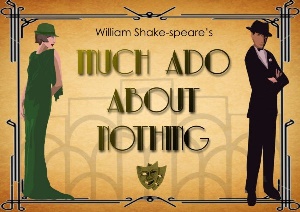
Starting an essay is difficult; just as a novelist has to use a compelling opening line to make people want to keep reading, so the first line of an essay needs to be attention-grabbing. Unfortunately, many students struggle with writing a strong opening line, and end up with something rather less engaging. A common one is to state the obvious, or summarise too broadly, and the expression “in many ways” crops up frequently. For example, in answer to an essay title of “How does Shakespeare show that Beatrice and Benedick are attracted to each other?”, a student might be tempted to begin their essay with the words, “Shakespeare shows the attraction between Beatrice and Benedick in many ways…” This “in many ways” construction is a weak and vague opening, and the essay would be better off without it. It would be better to be more specific, perhaps by making some opening observations about the role of this attraction in the play. This introduces the subject of how Shakespeare shows it without stating the obvious.
2. In this essay…
On the subject of weak opening lines, many essays begin by the student saying, “In this essay, we will look at such and such.” This is stating the obvious, so the words “in this essay” are unnecessary. Incidentally, the use of the ‘royal we’ as seen in this example is also a cliché, and best avoided in an academic essay if you can.
3. The next point I want to make is that…

This phrase is an obvious attempt at padding an essay out to increase the word count. You don’t need to signpost an essay in this way, and what’s more, this is a weak way of moving from one argument to another. Ideally, you should make thematic links between paragraphs or points, moving logically through your arguments, rather than simply listing them one by one in the manner implied by a phrase like “The next point I want to make”. If you can introduce the subject of the next paragraph in the previous one, as a follow-up to what you’ve just been saying, then you will avoid the need to make a jarring leap with a phrase like this.
4. In order to
Simply writing “to” without the “in order” almost always results in a more elegantly worded sentence, and reduces the impression that you’re trying to pad out the essay to achieve the desired word count.
5. It is interesting to note that…

Another reason for students using overly long-winded or clichéd phrases in their essays is that they are often labouring under the misapprehension that certain phrases make their essays sound more intellectual. Introducing a point with the phrase “It is interesting to note that…” is an example of this. Students perhaps imagine that it gives of an air of intellectual curiosity, but it’s really a waste of words. The sentence will almost certainly work – and be stronger – without it. For example: “It is interesting to note that Larkin neglects to mention…” It’s a stronger, more decisive statement if you remove the first few words: “Larkin neglects to mention…” An alternative, and more elegant, construction might be: “such and such is notable by its absence in Larkin’s work”.
6. The author uses…
Another cliché in student essays – specifically English essays this time – is to make points by saying “the author uses…”, as in “The author uses such and such a literary device to draw the reader in” or “The author does such and such to catch the reader’s attention” or “The author uses such and such to show…”. Simply stating what the technique is and what effect it has will be sufficient; it’s obvious that it’s the author who’s using it, so you don’t need to say as much.
7. The main way

The irritating thing about this phrase (for example, “The main way in which Brontë creates a feeling of gloom is by…”) is that it suggests that you don’t have a full grasp of the facts. It’s implying that there are other ways too, but that the writer thinks they can get away with not discussing them properly. Leaving aside this, it’s still an annoyingly over-used phrased, so if you can’t avoid it, replace it with “primarily”. Otherwise, try to be more specific.
8. As mentioned earlier in this essay
You should try not to repeat yourself, as implied by mentioning something you’ve said already; and ideally you shouldn’t refer to “this essay” at all. If you do need to refer to something you’ve mentioned previously, you could use the word “aforementioned” instead.
9. Situation

A staple of History or Politics essays, referring to something happening as “the situation” weakens your essay because it’s too vague. An example would be, “The situation in London was no better” or “Octavian took stock of the Mark Anthony situation”. It’s always better to be specific in essays, as being vague makes it look as though you don’t quite know what you want to say, even if you do.
10. Aspects
If you find yourself using the expression “various aspects” in an essay, remind yourself that this is too vague and try to qualify what these “aspects” actually are.
There’s no place for the second person (for example, “you would think that the experiment would show that…”) in an essay; academic prose should be written in the third person.

It’s an oft-quoted piece of essay advice, but to a large extent avoiding the first person pronoun “I” is also advisable. However, it’s a balancing act because, for humanities essays at least, it’s good to include your own opinion. The trick is not to allow the essay to become dominated by your opinion, or continually to make comments such as “I feel this is because…” or “I think such and such is being disingenuous.” The focus should be on an objective and balanced assessment of the arguments, with your own opinion included perhaps at the end, as you weigh up what you’ve been discussing. It’s still possible to include your authorial voice without using the first person pronoun, and even without saying “it seems to me that…”; simply state it in the third person: “The evidence appears to point more towards such and such…”
13. Considered to be
You’ll almost certainly find that changing “considered to be” to just “considered” makes your sentence flow better.
14. First names
The formal conventions of essay-writing dictate that people (such as other authors, historical protagonists and so on) are always referred to people by their surnames, so first names are a no-no.

Just like “aspects”, the word “things” is too vague. If you’re tempted to write something like “Things in London had improved”, make it more specific: “Social housing had improved quality of life in London”, for example.
16. Lots/lots of
On the subject of vagueness, another phrase to look out for is “lots” or “lots of”. It’s not only vague – it’s too colloquial. It’s better to say “much” or “many” if you have to (so “there were many reasons” rather than “there were lots of reasons”, for example). Even better, be specific and include actual figures; “5,000 more immigrants arrived in the town this year than last” is far better than “There were lots more immigrants arriving in the town this year than last”.
17. On account of
Using three words when one would suffice is a symptom of not knowing what you want to say, and thus trying to bolster the word count. It’s much better simply to say “because” rather than “on account of”.
18. Additionally

Some students use this word as an alternative to “also” and “as well as”. However, used in this context it’s weak – and it can be a tell-tale sign that you’re writing a boring essay that simply lists facts. Better phrases to use instead include “what’s more”, “furthermore” or “moreover”; all these help build an argument, while “additionally” makes it look as if you’ve tagged on an extra fact as an afterthought.
19. Words that imply absolutes
Words such as “always”, “never” and “everywhere” should be avoided because they’re difficult to defend and imprecise, coming under the category of sweeping generalisations. There are usually plenty of exceptions when you make a statement such as “People everywhere were feeling the effects of such and such” or “Never before had such generosity been witnessed”. Exact figures are preferable, and if these aren’t possible, then at least soften your statement to allow for the possibility of exceptions.
20. In conclusion
There can be few more hackneyed phrases than “in conclusion”. It’s infantile and puts one in mind of the essays one wrote years ago when in primary school. We know that the essay is coming to an end – we can see that – so we don’t need to signpost it by saying “in conclusion”. Instead, simply launch straight into your closing arguments.
Other ways to make your essay more original

We end by looking at some more general tips to help you write a more original essay. It’s not just individual words and phrases that examiners are tired of reading; what you write about, and the way in which you write about it, can also become tedious when everyone writes the same things. The following tips should help you increase the originality of your essay; you’ll find more detail on each of these tips in our article on how to write a more original essay .
Use more advanced language and syntax
We’ve already seen how the language you use can make your essay boring, so a more general piece of advice is to try to use more advanced language and syntax (sentence structures). You could try using techniques such as analogy to explain complex concepts, as most students will not think to do this. Providing you can demonstrate a firm understanding of what you’re writing about, explaining it clearly and confidently, it doesn’t really matter how you do it, so a well-chosen analogy could work well.
Write about less well-known aspects of the subject

Though the essay question will give a pretty good indication of what your examiner wants you to write about, you can still add more interest to your essay, and make it stand out from the others, by including some less well-known facts and angles that you might not already have looked at in class. You can get inspiration by reading more widely around the subject, for example more obscure scholarship, or, for literature, other works by the same author. You can then make comparisons with other texts, bringing in opinions that the examiner probably won’t be expecting, and your essay will be a lot less predictable as a result.
Choose a different structure or angle
Finally, a formulaic structure is a sure-fire way to guarantee that you’ll be writing the same essay as everyone else. Some of the language we looked at earlier is partly the result of a formulaic structure (“In this essay”, “the next point I want to make”, “in conclusion”, and so on), and writing an essay that doesn’t send your examiner to sleep might be easier if you try experimenting with a different structure or approaching the topic from a slightly different angle to the one you think they’ll be expecting. You’ll still need some sort of introduction and conclusion, but with a little imagination, you should be able to produce an essay that’s a bit different from the rest.
- Have your assignments done by seasoned writers. We work 24/7. Just email us at:
- [email protected]

How to Replace I in Essays: Alternative 3rd Person Pronouns

replacing I in essays
Learning how to write an essay without using ‘I,’ ‘We,’ or ‘You,’ and other personal languages can be challenging for students.
The best writing skills recommend not to use such pronouns. This guide explores how to replace ‘I,’ ‘We,’ or ‘You’ in an essay and the methods to avoid them.
For those of us who have been able to overcome this, you will agree that there was a time when you experienced a challenge when finding alternatives to clauses such as “I will argue” or “I think.”

The good thing is that there are several methods of communicating your point and writing an essay without using ‘I’ or related personal language.
Let us Write your Essays! No Plagiarism
Get an expert writer to score an A in your next essay assignment. Place your order today, and you will enjoy it.
Why Avoid Using Pronouns in Formal Writing
Before identifying the communication methods without using personal language like “I,” it is best to know why we should avoid such language while writing essays.
The most important reason for avoiding such language is because it is not suitable for formal writing such as essays. Appropriate professional English should not include any form of personal pronouns or language.

The second and equally important reason to avoid using personal language while writing an essay is to sound impersonal, functional, and objective.
In formal English, personal pronouns conflict with the idea of being impersonal, functional, and objective because they make redundant references to the writer and other people.
Personal pronouns will make an essay seem to contain only the writer’s perspectives and others they have deliberately selected. Again, they will make the work appear subjective.
Another reason to avoid personal language while coming up with an essay is to avoid sounding as if you have an urgent need to impress the reader through wording.
Personal pronouns like “you” and “I” tend to suggest something important that is away from what the writing is all about.
By continually using “I,” “we,” or “you,” you are taking the reader’s attention from the essay to other personal issues. The essay becomes all about the writer.
That being said, let’s explore how to replace “I” in an essay.
Custom Essay Writing Service by vetted writers
Ways of avoiding pronouns “i,” “you,” and “we” in an essay.
You can replace the pronouns ‘I’, ‘You’, and ‘We’ by replacing them with acceptable wording, applying passive voice instead of pronouns, Using a third-person perspective, adopting an objective language, and including strong verbs and adjectives.
In our other guide, we explained the best practices to avoid using ‘you’ in essay writing and use academically sound words. Let us explore each of these strategies in detail.
1. Replacing it with an Acceptable Wording
This is a very good strategy for replacing “I” in an essay. The problem is that it is often difficult to find the right word to replace the personal pronoun. Though this is the case, “I” has some alternatives.
For example, if the verb that follows it revolves around writing and research, such as “…will present” or “…have described”, it is best to replace “I” with text-referencing nouns such as “the essay.”
If you wanted to say “I will present” or “I have described”, then the alternative will be “the essay will present,” or “as described in the essay.”
Another method of replacing “I” in an essay is using appropriate wording like “this writer” if the verb’s action is not within the text.
While this is sometimes acceptable, it is often advised to have no words here by using passive verbs or their equivalents.
A wording that may also be used but rarely suitable is “the researcher”. This alternative can only be used when your actions as a writer are completely detached from the writing.
2. Using Passive voice Instead of Pronouns
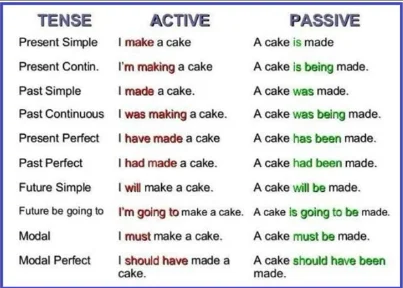
Another way to replace “I” and other personal pronouns in an essay is to use passive voice. This is achieved by transforming an active verb passive.
Though this is the case, the strategy is often difficult, and it may create sentence structures that are not acceptable in formal writing and language.
The sentences in which “I” can be successfully changed using this strategy is when an active verb describing an object is transformed into its passive form.
3. Using a Third-Person Perspective
This is a very important and applicable strategy when replacing “I” in an essay. This is where you avoid using first-person and second-person perspectives.
When referring to the subject matter, refer directly to them using the third person. For example, if you were to write, “I think regular exercise is good for mind and body”, you can replace it with “Regular exercise is good for mind and body”.
4. Use of Objective Language
Objective language is lost when a person uses informal expressions like colloquialisms, slang, contractions, and clichés. It is the reason why we discourage the use of contractions in essay writing so that you can keep things formal.
While informal language can be applicable in casual writing and speeches, it is not acceptable when writing essays. This is because you will be tempted to use a first-person perspective to convey your message.
5. Being Specific and using Strong Verbs and Adjectives
In most cases, essays that have been written using a lot of personal pronouns tend to be imprecise. When you want to avoid using “I” in your essay, try to be exact and straight to the point.
Personal pronouns tend to convey a subjective message, and it is up to the writer to explain their perspectives through writing.
Here, a writer will use a lot of “I think…” or “I believe…” to express their opinion. By doing so, the writer will end up wasting a lot of time explaining a concept.
Instead of doing that, it is best to look for appropriate verbs and adjectives to explain the points. Also, use objective language. Refer to the suggestions given by credible evidence instead of basing your arguments on what you think.
Get an essay written by a Team
Our team avoids plagiarism and ensures checks to guarantee a quality and ORIGINAL paper
Words to use Instead of Personal Pronouns like “You” and “I”
As noted, it is important to avoid using personal pronouns such as “You” and “I” when writing an essay.
By eliminating them or finding alternatives to them, your essay will be formal and objective. You can decide to eliminate them in a sentence.

For example, you could be having a sentence like “I think the author makes a valid point concerning capitalism.”
In this example, you can eliminate the personal language and write, “The author makes a valid point concerning capitalism.”
The second sentence goes straight to the point and is objective.
Other words to use instead of personal pronouns, like “You” and “I,” can be created when personal judgment words are avoided.
Instead, it is best to replace those words with those that refer to the evidence.
Examples of Ways to Replace Personal Pronouns
Below are examples of how personal judgment words can be replaced by words referring to the evidence.
- I feel – In light of the evidence
- From I think – According to the findings
- I agree – It is evident from the data that
- I am convinced – Considering the results
- You can see that – From the results, it is evident that
Using the third-person or “it” constructions can be used to replace personal pronouns like “You” and “I.” Such words also help to reduce the word count of your essay and make it short and precise.
For example, if you write “I conclude that, “replace those words with “it could be concluded that. ” Here, “it” constructions are helping replace personal pronouns to make the sentence more objective and precise.
To be more specific, words to replace personal pronouns like “I” include “one,” the viewer,” “the author,” “the reader,” “readers,” or something similar.
However, avoid overusing those words because your essay will seem stiff and awkward. For example, if you write, “I can perceive the plot’s confusion,” you can replace “I” by writing, “Readers can perceive the plot’s confusion.”
Words that can be used instead of personal pronouns like “You” include “one,” “the viewer,” reader,” “readers,” or any other similar phrases. It is similar to words that replace first-person pronouns.
For example, if you write “you can see that the poet’s tone is serious and urgent,” you can replace “You” by writing “readers/one can see that the poet’s tone is serious and urgent.”
Words to use Instead of “My” in an Essay
Since “My” demonstrates the possessiveness of something, in this case, the contents or thoughts within an essay, it makes the writing subjective. According to experts, writing should take an objective language . To do this, it is important to replace it.

You can replace the word “My” with “the”. For example, if you write, “My final thoughts concerning the issue are”, you can write, “The final thoughts concerning the issues are”.
In this case, the article “The” makes the sentence formal and objective.
Another method is eliminating the word “My” from the sentence to make it more objective and straight to the point.
In the same example above, if you write “My final thoughts concerning the issue are”, you can write “Final thoughts concerning the issue are”.
The major difference here is that the word “my” in the first example makes it subjective, and eliminating it from the sentence makes it sound formal and objective.
Final Advice
Therefore, when writing an essay, it is important to avoid personal pronouns like “You”, “I,” and “My.” Not all papers use third-person language. Different types of essays are formatted differently, a 5-paragraph essay is different from a 4-page paper , but all use third-person tones.
This is because an essay should be written in formal language, and using personal pronouns makes it appear and sound informal. Therefore, writing an essay without using ‘I’ is good.
Formal language makes your essay sound objective and precise. However, do not remove the first-person language when writing personal experiences in an essay or a paper. This is because it is acceptable and formal that way.
Order an Excellent Essay today!
Let us help you get that A in your next assignment. Place your order today, and you will enjoy the benefits.

With over 10 years in academia and academic assistance, Alicia Smart is the epitome of excellence in the writing industry. She is our managing editor and is in charge of the writing operations at Grade Bees.
Related posts
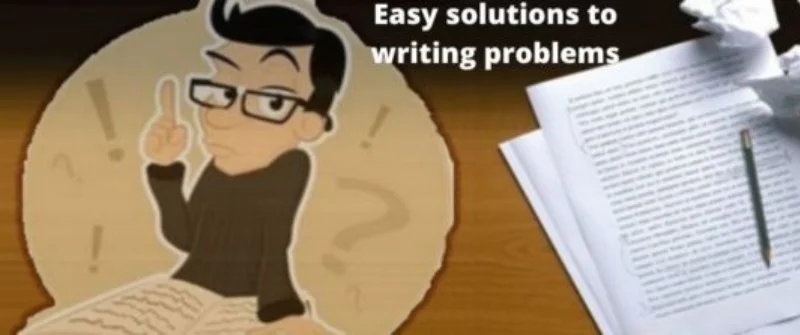
essay writing problems
10 Essay Writing Problems and their Easy Solutions
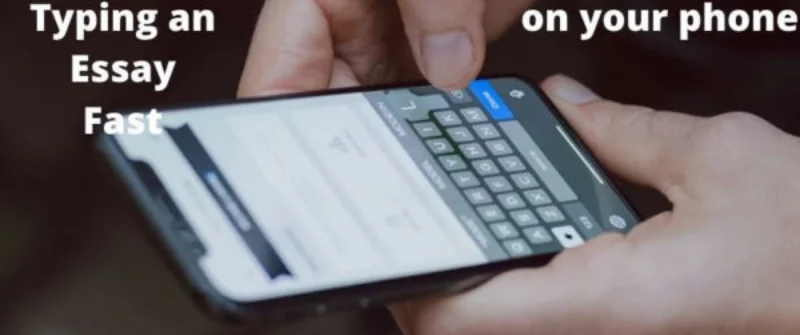
writing essay on your phone
How to Write an Essay or paper on your Phone: 3 Easy Ways
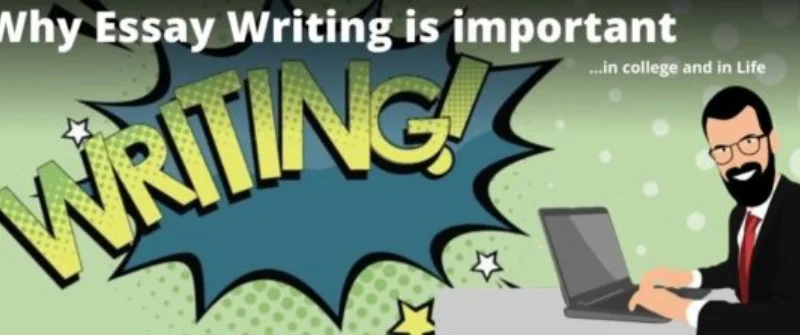
essay writing is important
7 reasons why Writing is Important in College & in Life
Global site navigation
- Capital Market
- Celebrity biographies
- Messages - Wishes - Quotes
- Fashion and style
- Celebrities
- Relationships
Local editions
- Habari za Kenya Swahili
other ways to say "in conclusion" in formal and casual writing
Considering the level of formality when writing is crucial – it shapes the tone and style of your communication. The phrase "in conclusion" is commonly used to signal the end of a discussion or argument, but several other ways indicate the same. Which other ways to say "in conclusion" will make it more engaging and add meaning to your writing for readers?

TABLE OF CONTENTS
1. in summary, 2. as has been demonstrated, .3. overall, it can be said, 4. logically, 5. long story short, 7. the above points illustrate, 8. undoubtedly, 9. in closing, 10. use a question, 11. to summer up, 12. in the final analysis, 13. last but not least, 14. on a final note, 15. in a nutshell, wrapping up.
Writing your introduction formally or casually can be an exciting and important part of the article. But also crafting a well-rounded conclusion is essential to the impact of your writing. It's the final opportunity to emphasise the main points and create a lasting impression.
But sometimes, overusing the phrase "in conclusion" can be monotonous. That's why exploring other phrases for "in conclusion" that are suitable to use while concluding your writing will help you not sound too repetitive.
Other ways to say "in conclusion"
Whether you're writing a formal essay or a casual blog post, knowing different ways to wrap up your thoughts can greatly improve the impact of your conclusion. Choosing a benefiting phrase from a list of other ways to say "in conclusion" will have a positive effect on your reàder.

Check out how to write an application letter for attachment in a hospital
The phrase gives the reader a clear heads-up that the writer's article is on the final point. It informs that the writer will restate the main points of the written material and draw a conclusion from those points. So, why not differentiate from the others using a summary instead of a conclusion phrase? It still sounds unique, but in the best way.
'As has been demonstrated' is a simple way of concluding all your points and running down everything you have to confidently state that those points have convincingly proven your case. The phrase is the best when you want to sound formal in official writing .
To capture an idea at the end of critical or descriptive writing, use the phrase 'Overall, it can be said' at the beginning of the last paragraph. The phrase brings out the writer's essence, where they engage their audience by saying what they feel about the article's topic. It is a general phrase that captures your thoughts.

Sample application letter for a supermarket job in Kenya with writing tips

The phrase logically is usually used at the beginning of any paragraph that states a series of facts backed by clear steps to follow that will lead the reader to the end of the writing. It's a great way to conclude your writing in a balanced and comprehensive manner.
"Long story short" is one of the synonyms for "in conclusion" in an essay, but it's more casual. It's best used in writing that has a conversational or informal tone. When you use the phrase, you will summarise what you've been talking about briefly and straightforwardly. It's a quick and easy way to wrap up your thoughts, especially when you want to avoid going into too much detail.
So, if you're writing something that's meant to be read in a relaxed way, like a blog post or a personal story, "long story short" could be a good fit.

Short application letter for a waiter position: Writing guide and examples
"Lastly" is often used in argumentative or informative writings. When you're about to share the final point or idea, the best way is to start with "Lastly" to signal that you're wrapping up your argument or discussion. It's usually seen in the first or last sentence of the concluding part of an essay.
When writing something formal and you're about to share your final thoughts or observations, using "the phrase can be effective.
The phrase best introduces a conclusion, particularly when discussing the impact of the points made in your essay. It's a good way to transition from the body of your essay to your final thoughts, and it smoothly leads to a statement that supports your main argument or thesis.
After using "The above points illustrate", conclude your key points and show how they back up your main argument. The phrase makes your conclusion strong and reinforces the points you've made throughout your writing.

How to write a retirement letter: Step-by-step guide with samples

The phrase is particularly useful when emphasising the certainty or obviousness of your argument or point. Starting your concluding remarks with "Undoubtedly" signals that you're wrapping up your thoughts and gives assurance about your statements.
Therefore, "Undoubtedly" is a strong and assertive way to conclude your writing, leaving your readers with a clear impression of your viewpoint.
A classy alternative to in conclusion, in writing, is "in closing". It is a somewhat formal expression without being flowery. This transition phrase is especially useful for the last sentence of a conclusion. It is a good signal that you are nearly at the bitter end of your essay or speech.
A particularly common way to use in closing is to signal in an argumentative piece that you are about to give your call to action.
The use of questions is among the many ways of how to say "in conclusion" differently. When writing your essay, choosing to end with a leading or an open-ended question brings out your creative side. It will leave your readers thinking about the argument you have made as well as engage them in the discussion.

Executive assistant cover letter writing tips and examples
Are you wondering how to say "in conclusion" without saying "in conclusion"? The phrase "to summer up" is one of the best phrases to replace the use of "in conclusion". It is used to indicate that you are summarising your main points. It works well with formal writing, though sometimes it is used in informal writing.
The phrase prepares your reader that the writing is coming to an end. Following this phrase, you concisely reiterate your main points, reinforcing their importance and reminding your readers of the key takeaways from your piece.

The phrase is a great expression in your conclusion since it's a less clichéd and more refined way to begin a conclusion. Once you start drawing things to a close, using it, in the final analysis, allows you to tail nicely into your last summation.

How to write a character letter to a judge for a friend
"Last but not least" is another phrase that can be used as an alternative to "in conclusion." It's a way to introduce your discussion's final point or topic, implying that while it may be the last point, it's just as important as the others. This phrase is often used to wrap up lists or series of points.
When you use "the phrase, it adds a sense of completeness to your discussion and emphasises the significance of the final point, ensuring it doesn't get overlooked because it's mentioned last.
Can you use a final note to close your writing? Before you wrap up your final thoughts, you want to leave your readers with one last alternative in the conclusion. Using this expression; you get the chance to express your thoughts by letting your reader get prepared for the final point. This phrase is a standalone to be used in both writing and speeches.

Alternatives to "I hope this email finds you well" in formal communication
The expression is used to indicate that you are about to give a short summary. It's appropriate to use in a nutshell both in writing and in speeches, but it should be avoided in contexts where you're expected to use a serious, formal register. In a nutshell, the expression can also signal you've reached the end of a story or argument you were writing about.
The above are other ways to say "in conclusion" in formal and casual writing. Regardless of how you conclude your writing, the most important part of the conclusion is leaving a lasting impression on your readers. And why not try new options such as the above that will inspire you to conclude your writing in a new style?
Tuko.co.ke shared an article about Thank You email subject lines for mails after interviews. After the interview, you ought to express your gratitude to the interviewer with an email following up. The email subject line is the only section of your message that the interviewer will see when they check their inbox, so it is important that you pay close attention to it while you are writing.
Captivating thank you email subject lines for emails that increase the likelihood that the recruiting professional will open and read your email following the interview. An effective way to make a good impression and differentiate yourself from other applicants is to send a thank-you email following the interview.
Source: TUKO.co.ke
Gladys Mokeira Obiero (Lifestyle writer) Gladys is a content creator who has worked with Tuko since 2018, where she won the Best Writer Award in 2022. She previously held other positions, including an editing role at Kami.com.ph, Yen.com.gh, and Legit.ng. She graduated from the University of Nairobi with a Bachelor’s Degree in Project Planning and Management. In 2023, Gladys finished the AFP course on Digital Investigation Techniques. Email: [email protected]

IMAGES
VIDEO
COMMENTS
Conveys a strong and aspirational goal for your essay, highlighting its potential impact. Example: The ambition of this work is to reimagine the future of education, promoting personalized learning experiences that ignite students' curiosity and foster lifelong adaptability. 10. Within this text, I aspire to….
"In this essay, I will" is a common way for people to talk about what they will write in their essays. However, it's often overused, which is why it might be wise to look into a few available alternatives. This article will share the best ones with you. What Can I Write Instead Of "In … 10 Better Ways To Write "In This Essay, I Will…" Read More »
1. You Will Learn About. One of the best alternatives to "in this essay, I will" is "you will learn about.". Using "you" instead of "I" makes it clear to the reader what to expect from your essay. Generally, this phrase implies that you are writing your essay for the reader. It puts them in control and shows them that they ...
If you're wondering what to say instead of "in this essay I will," we'd go with the phrase "the purpose of this paper is.". This alternative is great if you want to completely alter your choice of words in your introduction. It replaces "essay" with "paper" and removes the personal pronoun "I" to boot! This makes this ...
Warm regards, Charles. Additional Insight: "Delving into" suggests a deep exploration or immersion into a subject, indicating that the essay will provide in-depth analysis and insights. 8. Uncovering. Scenario Example: Subject: Uncovering the Origins of Mythological Archetypes Dear David, I'm excited to share with you an upcoming essay focused on uncovering the ancient origins of ...
10 Alternative Ways to Say "In This Essay, I Will". Below, you'll find 10 other ways to say in this essay, I will in an academic paper: 1. The Aim of This Essay. You can use the aim of this essay to introduce your topic without including the personal pronoun "I.".
Well, it depends on what the rest of that sentence is. If it's "In this essay I will explain the difference between grilled cheese and melts." then replace it with "Grilled cheese and melts are different things for several reasons." Like, that's kind of a silly, clunky example, but hopefully it illustrates the gist.
I wouldn't do either. It's obviously an essay or document. If the title isn't clear enough, try writing the opening paragraph in a different, more interesting and unique way. Grab the reader's attention and make them interested in the topic. You: In this essay, I will discuss Digifant and its applications in mid-80s Volkswagens.
The construct "In this essay I will argue…" is a variant of this, which by acknowledging that a particular argument is to be made, tacitly acknowledges other arguments could also be made. Similar constructs, such as "In this essay I will demonstrate…," operate in the same way. "In this essay I will…" is a perfunctory way of ...
Just cut straight to the point. For example: Instead of "This essay will compare the domestication of rice in east Asia and the domestication of wheat in western Asia." you could write this as "Though both are domesticated grasses, the domestication of rice in eastern Asia is very different from the domestication process of wheat in western Asia."
Instead of using the phrase "In this essay, I will discuss...", you can employ alternative phrases that convey the same meaning while adding variety and sophistication to your writing. Here are some alternative ways to introduce the main topic or argument of your essay:
Your IELTS discussion essay thesis statement should do two things: Tell the reader what the essay will do; Present your opinion; Because this is a formal essay, it is best not to be too personal. Instead of saying "I will…" or "I think…" it is better to say "This essay will…"
67 other terms for i will discuss - words and phrases with similar meaning. i'll talk about. i will negotiate. shall comment. going to argue. i rise to speak. i shall deal. i am going to talk. i will talk.
69 other terms for in this essay - words and phrases with similar meaning. in this paper. in this article. in this assay. during the course of this article. in this piece of writing. in this white paper. in this attempt. at this writing.
back from the dead. back in the day. back into place. C. call a truce. call it a day. call it a night. call it quits. D.
Bottom line: It matters little. What will matter is all the other words you choose to use. An adcom isn't going to parse between "will", "would", "hope to" and "plan to". It's semantics and given the number of applications and essays to read, I think it matters very little what word choice you use amongst these options.
What To Say Instead of "I Agree" in an Essay. Here are 10 other ways to express agreement in an essay: I concur with this viewpoint. This argument resonates with me. I am in alignment with this perspective. My stance coincides with this position. I share the same convictions on this matter. This assertion is consistent with my understanding.
or could say. Those conditions need not be considered here. but for brevity might instead say "I'll say no more of this now" or use an old standby, "But I digress". Of course, as Brian Donovan has noted in an answer, there's little need in an essay - a fairly short work - for such a sentence at all.
To do this, use any of the below words or phrases to help keep you on track. 1. Firstly, secondly, thirdly. Even though it sounds obvious, your argument will be clearer if you deliver the ideas in the right order. These words can help you to offer clarity and structure to the way you expose your ideas.
Sep 30, 2020. I cannot think of a better way to ruin one's essay than starting it with the phrase "In this essay, I will discuss…". This will have a similar effect as informing your listeners that now they will laugh before telling a joke. Or imagine you are watching a TV and just before a commercial there are words on the screen or a ...
Maintaining a formal voice while writing academic essays and papers is essential to sound objective. One of the main rules of academic or formal writing is to avoid first-person pronouns like "we," "you," and "I.". These words pull focus away from the topic and shift it to the speaker - the opposite of your goal.
11. You. There's no place for the second person (for example, "you would think that the experiment would show that…") in an essay; academic prose should be written in the third person. 12. The focus of the essay should be your thoughts and ideas themselves, not a narrative of how you came to them.
A wording that may also be used but rarely suitable is "the researcher". This alternative can only be used when your actions as a writer are completely detached from the writing. 2. Using Passive voice Instead of Pronouns. Another way to replace "I" and other personal pronouns in an essay is to use passive voice.
Other ways to say "in conclusion" Whether you're writing a formal essay or a casual blog post, knowing different ways to wrap up your thoughts can greatly improve the impact of your conclusion. Choosing a benefiting phrase from a list of other ways to say "in conclusion" will have a positive effect on your reàder.
Cunningham got up to use the restroom around 4:30 a.m. and heard rapid gunfire, according to prosecutors. He came out of the bathroom to find his grandmother shot in the head.